Under the cover of darkness, a security guard will take down the British flag that flies outside the European parliament. Its removal won’t leave a gap: the flags, which are arranged in alphabetic order, have always had the UK at the end of the row.
There is no big ceremony in Brussels for Britain’s departure from the EU: rather, lots of smaller ones, some private and behind closed doors.
The city said its farewells on Thursday, lighting up its beautiful Grand Place in the colours of the Union Jack and throwing a festival featuring red telephone boxes and a black London taxi. Brussels itself is apart from the bubble inhabited by the EU institutions, however: the approach there has been no pomp, no circumstance – no last night of the proms.
Download the new Independent Premium app
Sharing the full story, not just the headlines
For the EU authorities, the strategy has been to keep things as low-key as reasonably possible. The three presidents of the commission, council and parliament held a press conference on Friday morning: the EU was losing a member state that was “very pragmatic, very down to earth, very clear in the economic agenda”, Ursula von der Leyen said. Polite, but not exactly the end of the world.
The presidents were not really there to talk about Brexit – instead, Brussels is trying to reclaim the narrative by talking about the future of Europe, and it plans to host a conference on the subject in early May.
Despite the focus on the future, the venue very much recalled the continent’s past: deep in the bowels of the parliament’s dimly lit museum to pan-European democracy, anyone attending was required to walk past long rows of exhibits about the continent blowing itself up in the Second World War.
To the back of the auditorium, banks of tables were staffed by a dozen translators live-interpreting the meeting into all the EU’s working languages; their work wirelessly beamed to the headsets of the audience. This impressive operation is a perfectly routine scene in Brussels, but to anyone not used to the transnational nature of what goes on here, it might look like science fiction.
Two hours before the press conference, on the other side of the modernist plaza where the museum is situated, Brexit Party MEPs had triumphantly marched out of the European parliament’s main entrance. They bore the Union Flag and branded teal umbrellas, and were briefly interrupted by a pro-EU heckler. Later in the evening, just before midnight, Labour MEPs and staffers will gather at Place Jo Cox, a small square in Brussels named after the MP assassinated by a far-right terrorist during the referendum campaign.
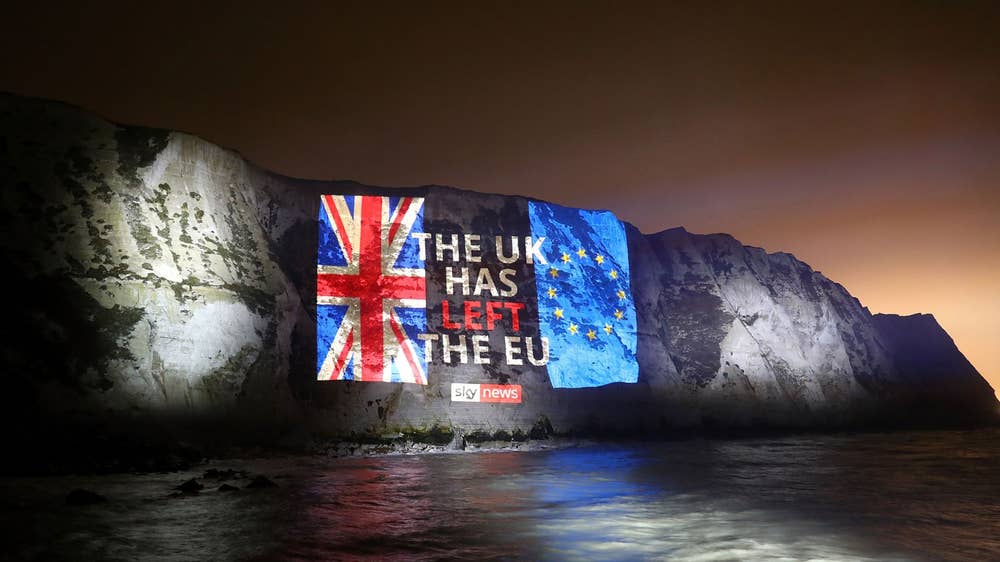
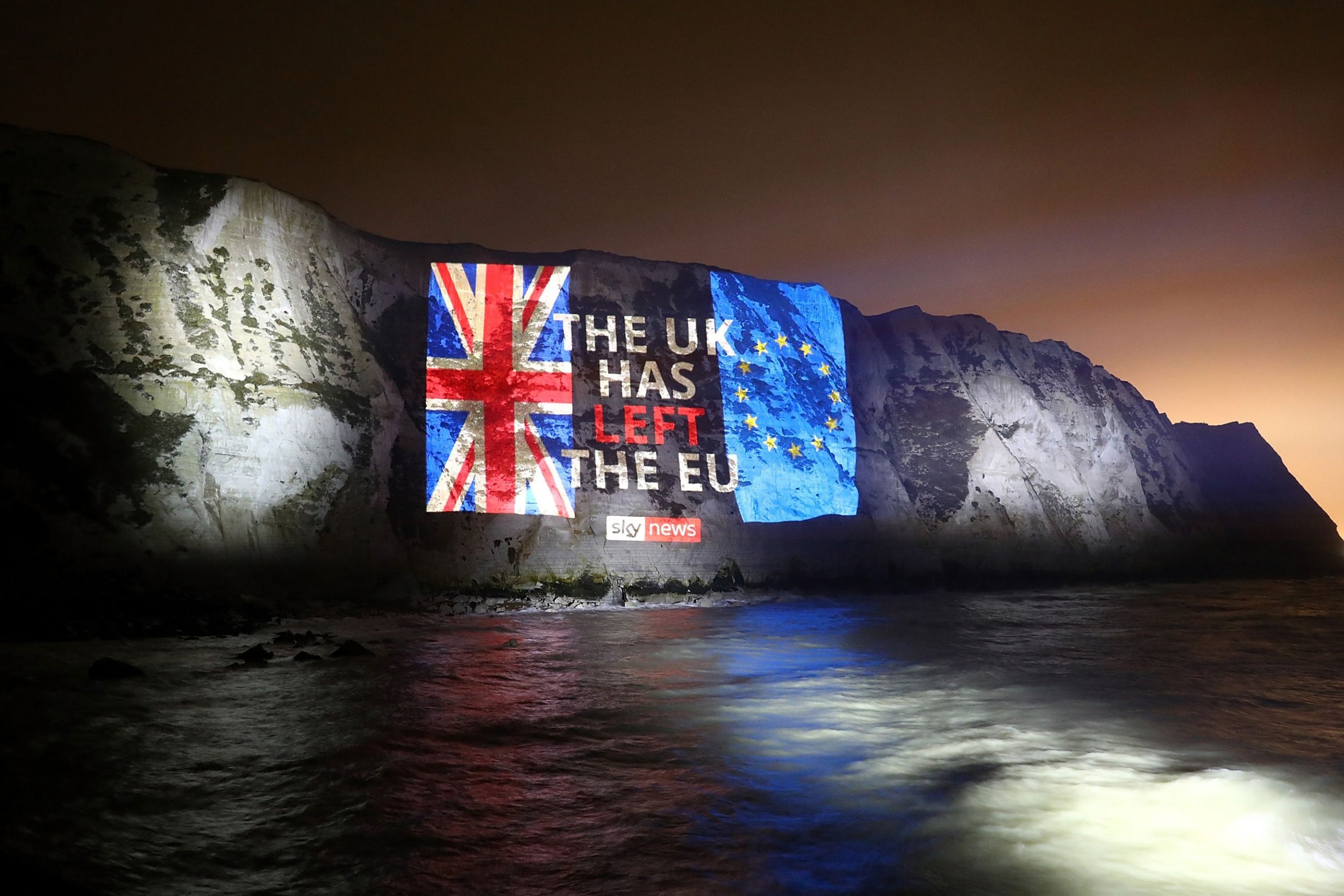
1/66
A message projected onto the White Cliffs of Dover
Sky News/AFP via Getty
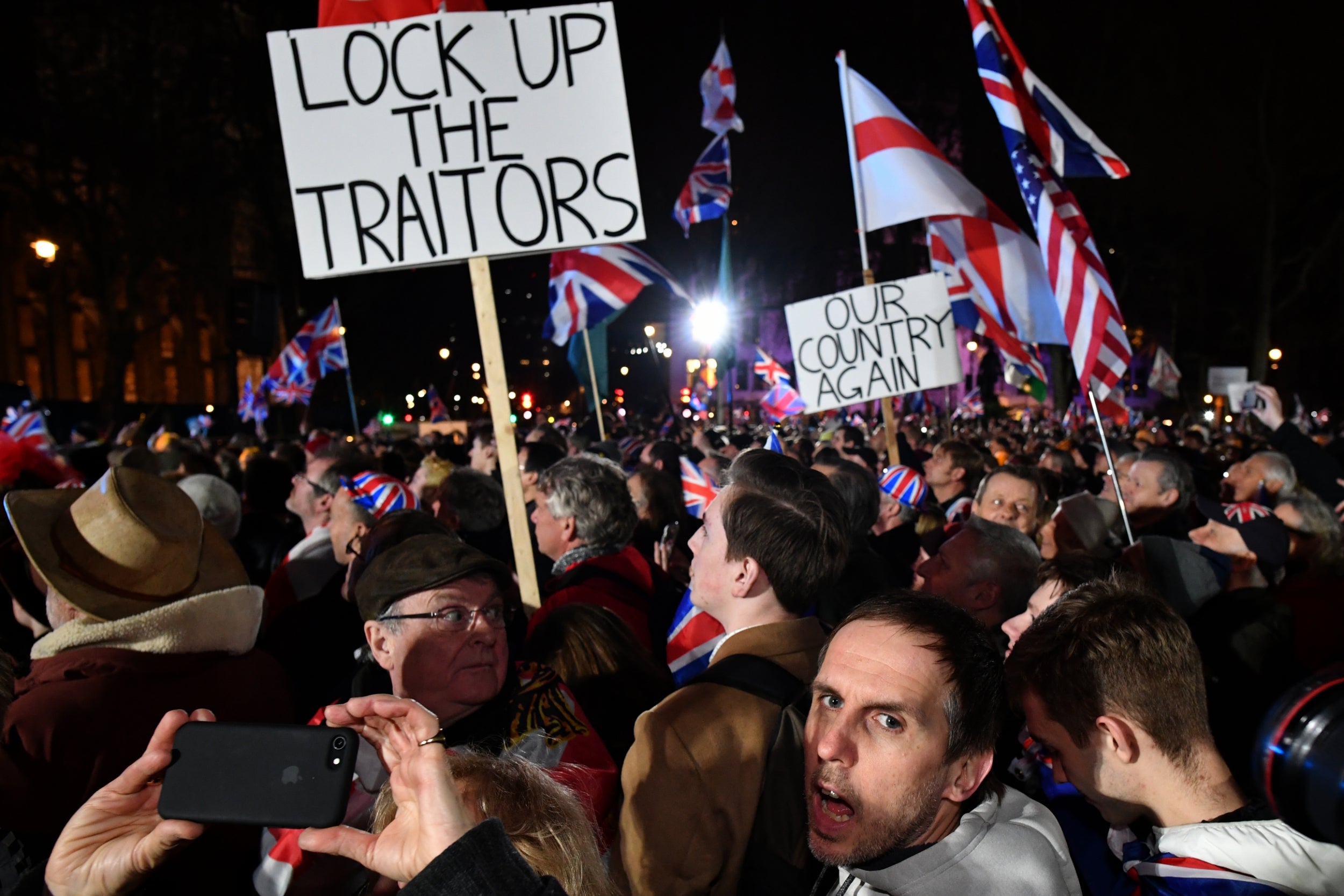
2/66
Getty Images
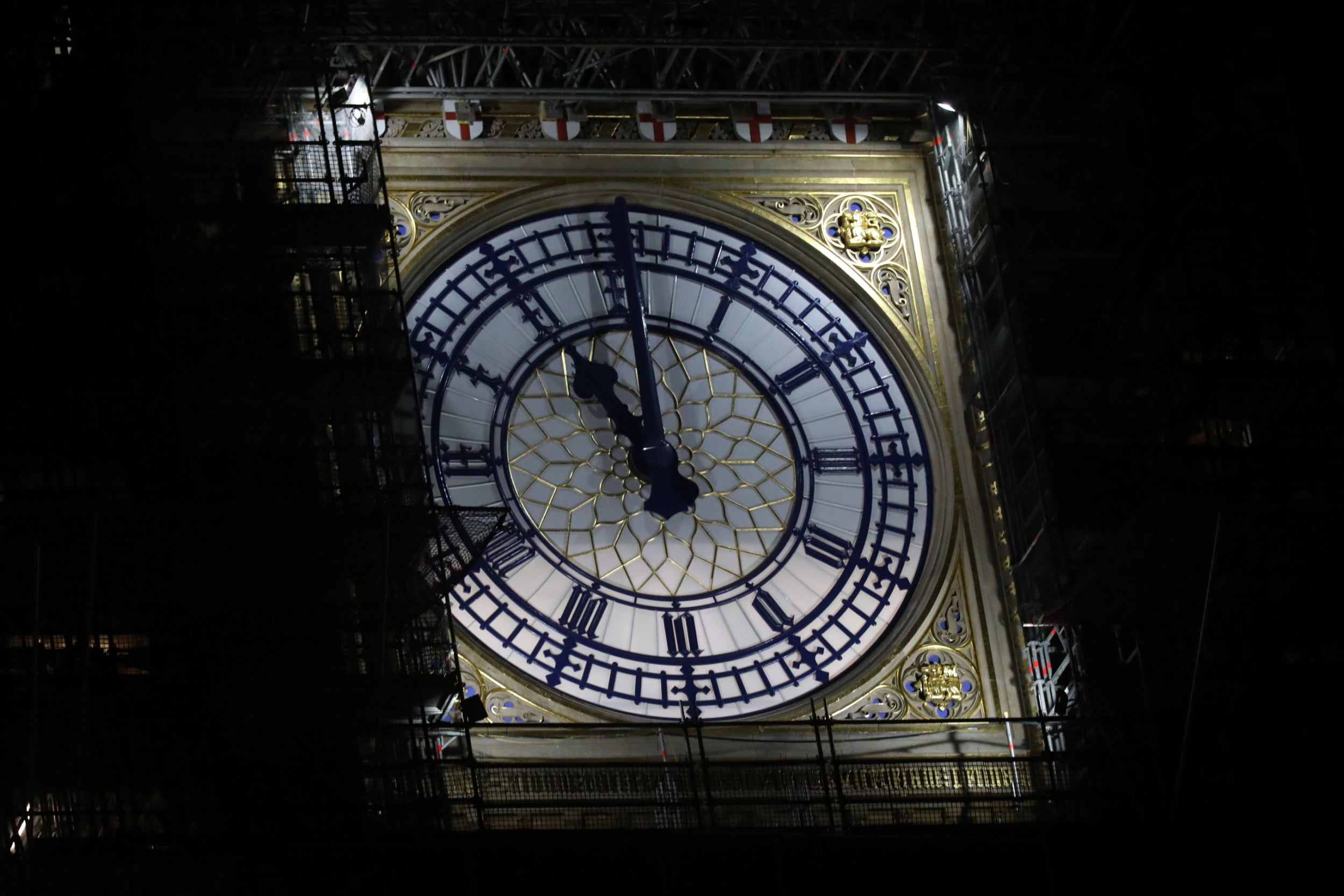
3/66
Big Ben, shows the hands at eleven o’clock at night
AFP via Getty Images
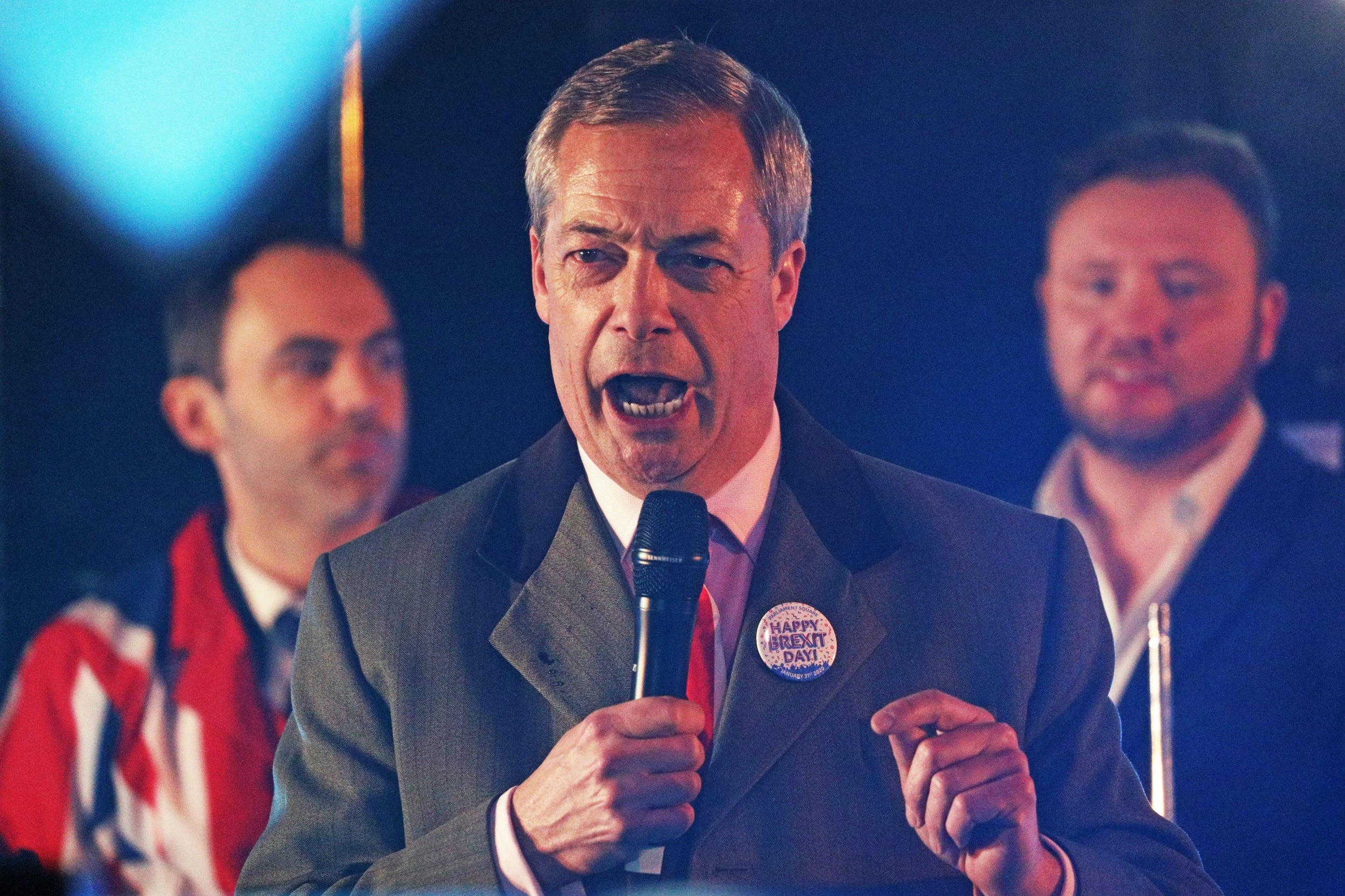
4/66
Nigel Farage speaks to pro-Brexit supporters
PA
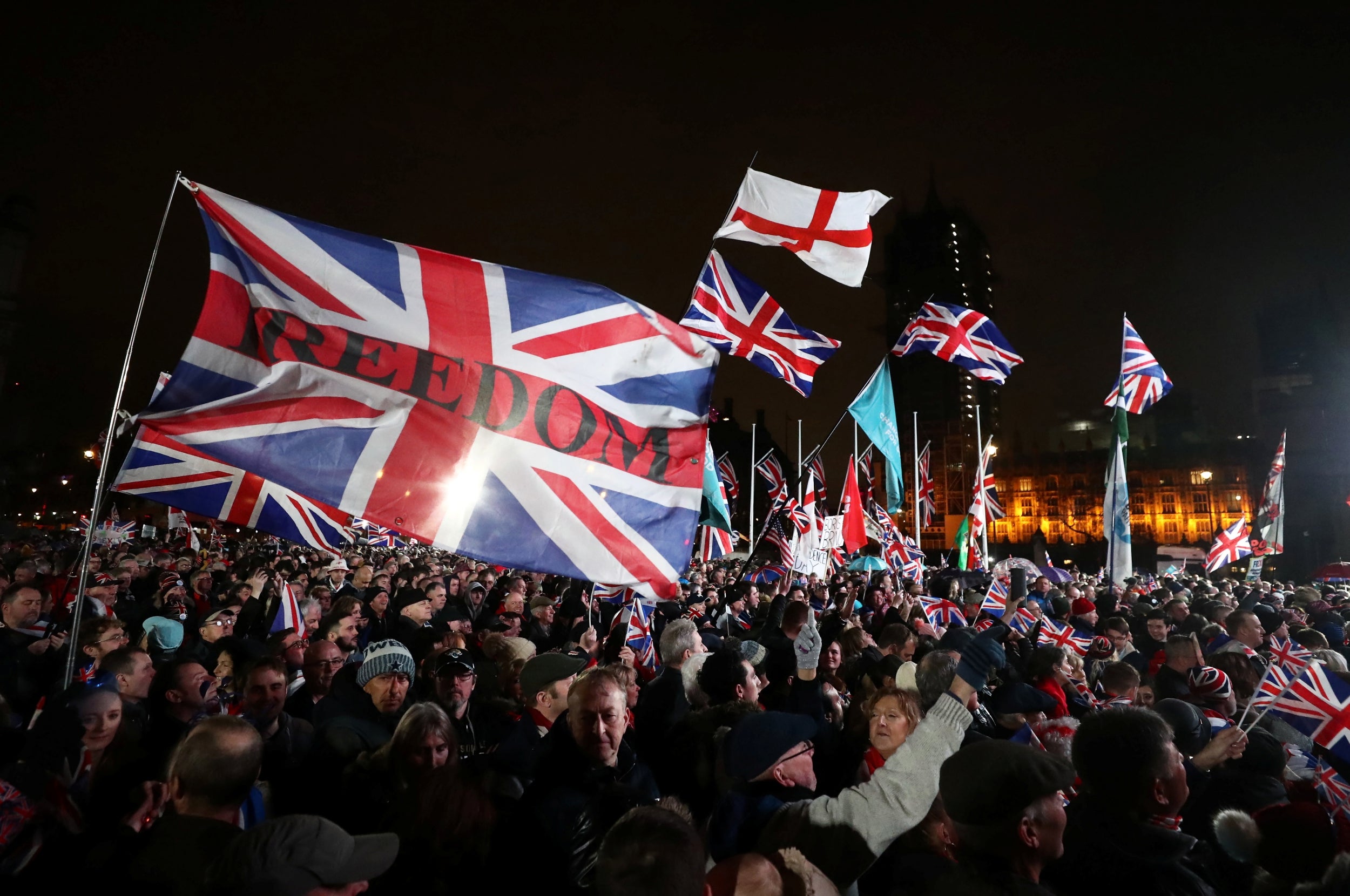
5/66
Pro-Brexit demonstrators celebrate on Parliament Square
REUTERS
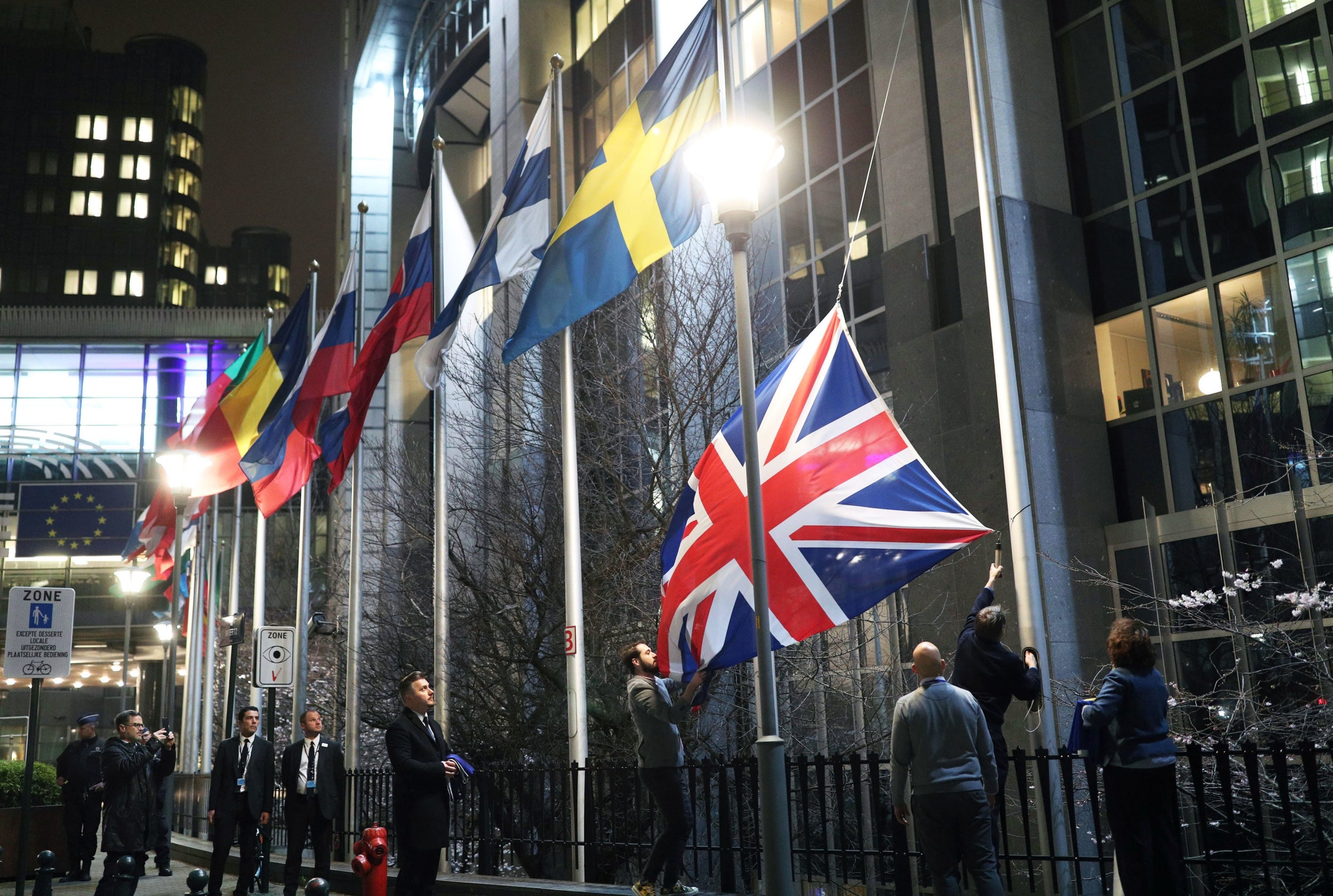
6/66
The Union flag is taken down outside the European Parliament in Brussels
PA

7/66
Pro-EU campaigners outside the Scottish Parliament, Edinburgh
PA
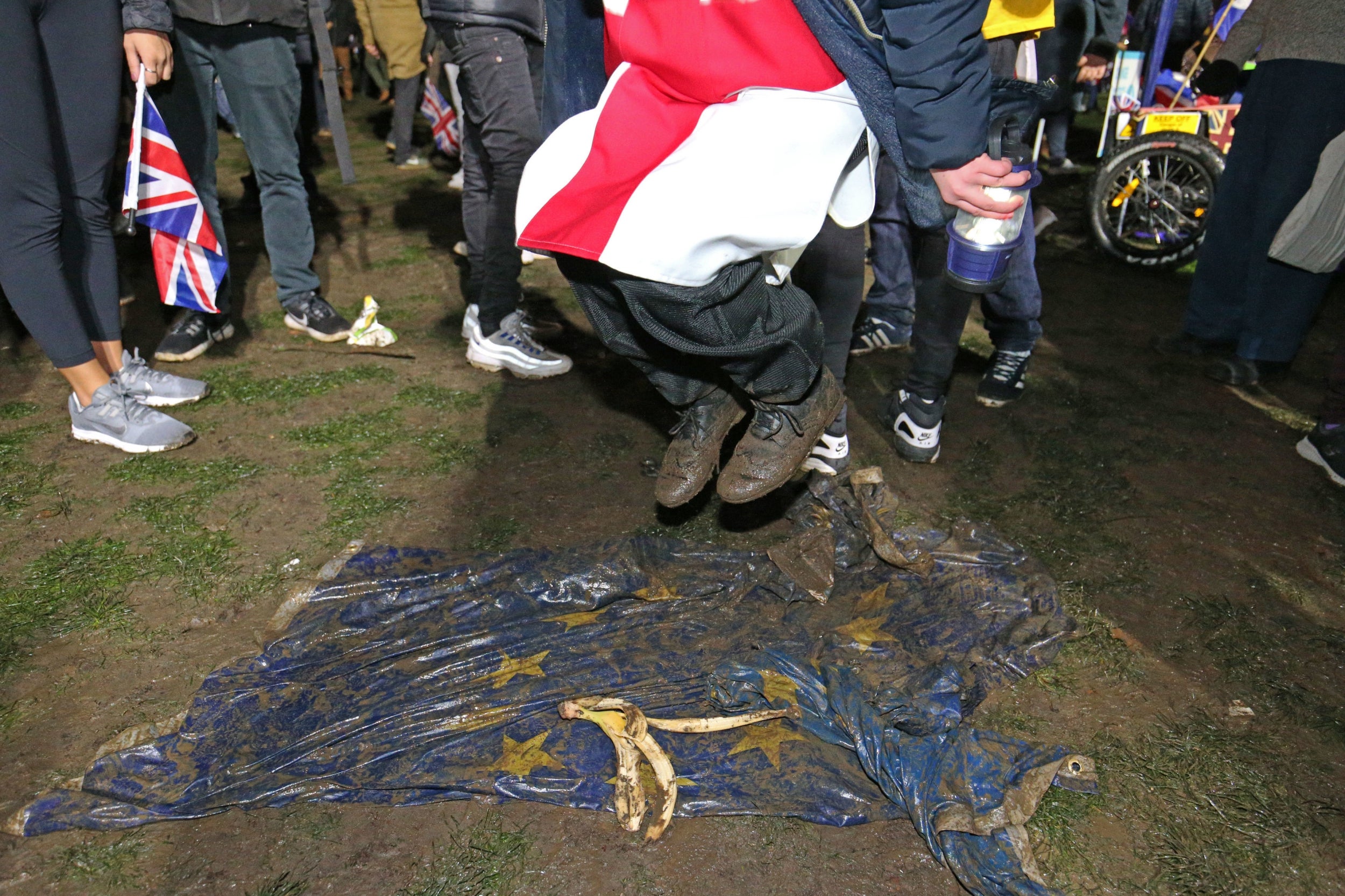
8/66
A pro-Brexit supporter jumps on an EU flag in Parliament Square
PA
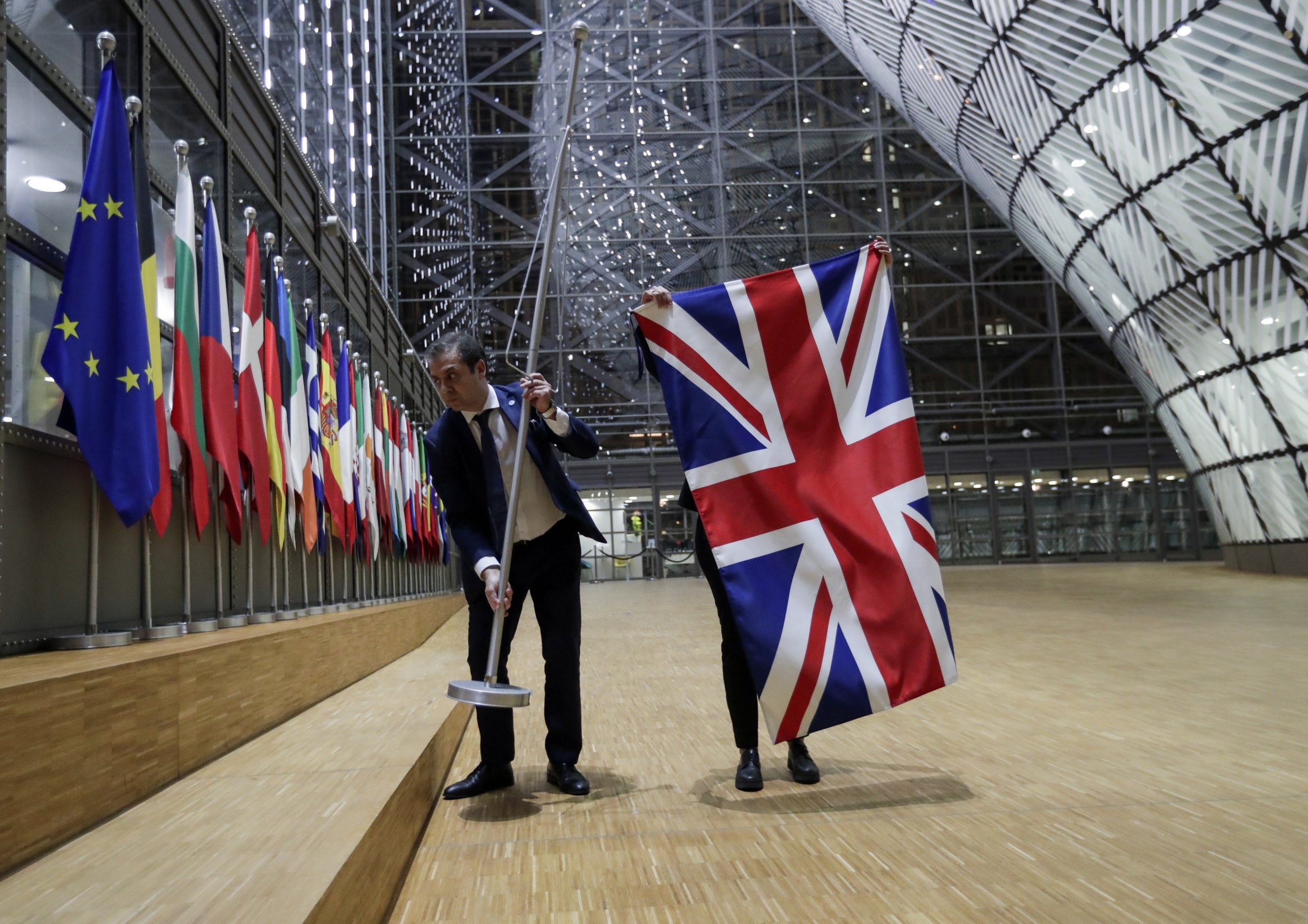
9/66
EU Council staff removed the Union Jack-British flag from the European Council in Brussels, Belgium
EPA
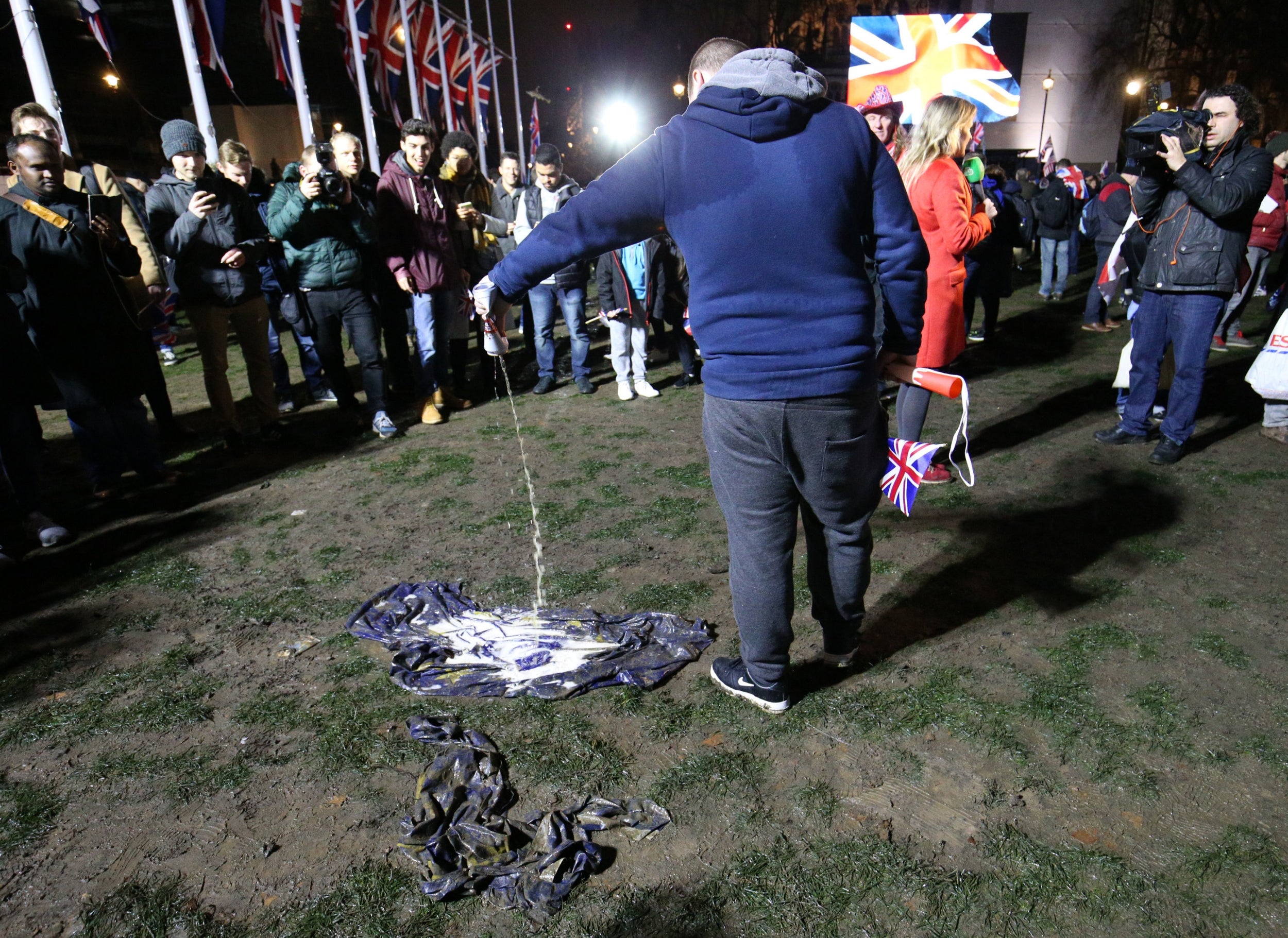
10/66
A pro-Brexit supporter pours beer onto an EU flag
PA
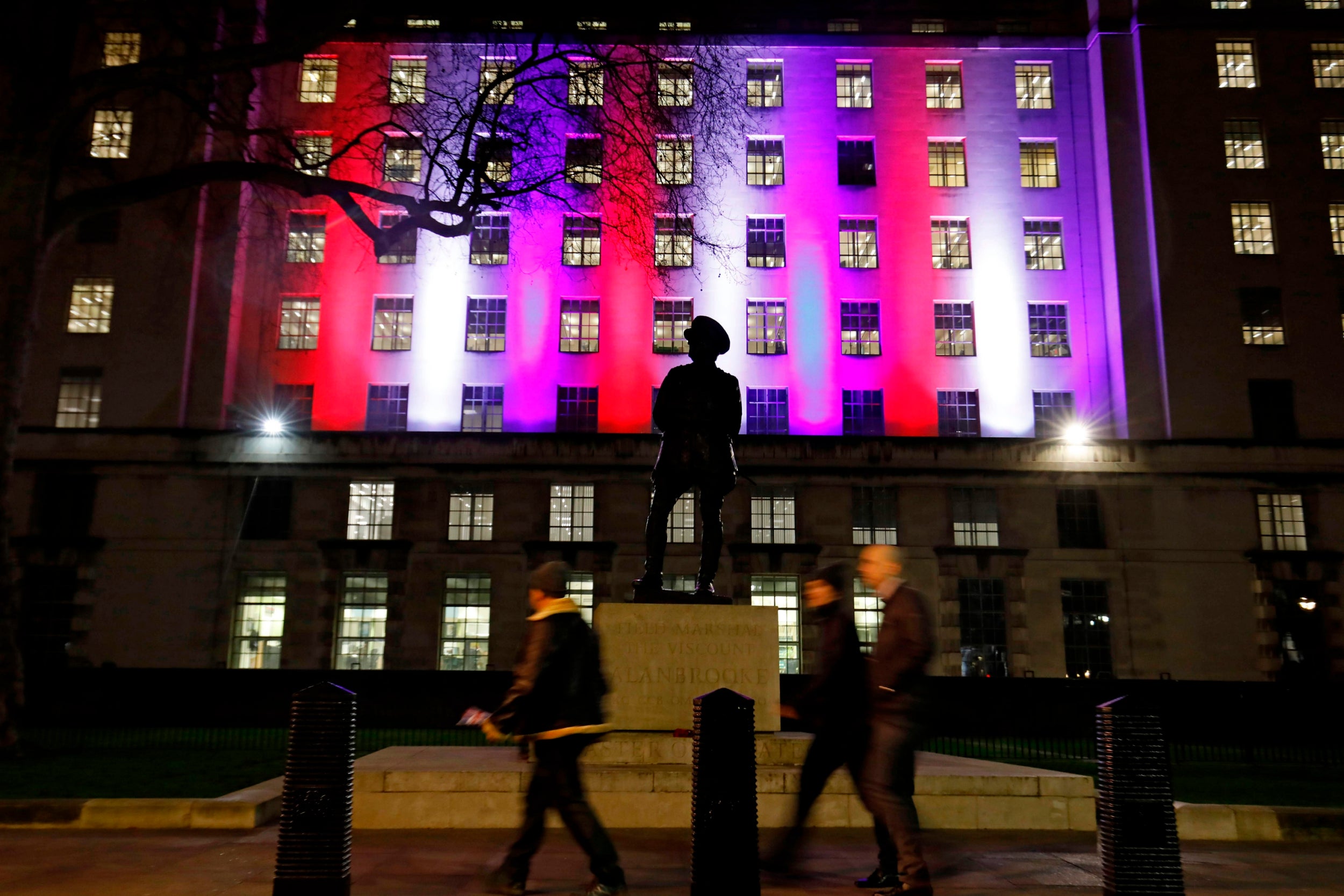
11/66
Pedestrians pass in front of the Ministry of Defence Building on Whitehall, illuminated by red, white and blue lights in central London
AFP via Getty Images
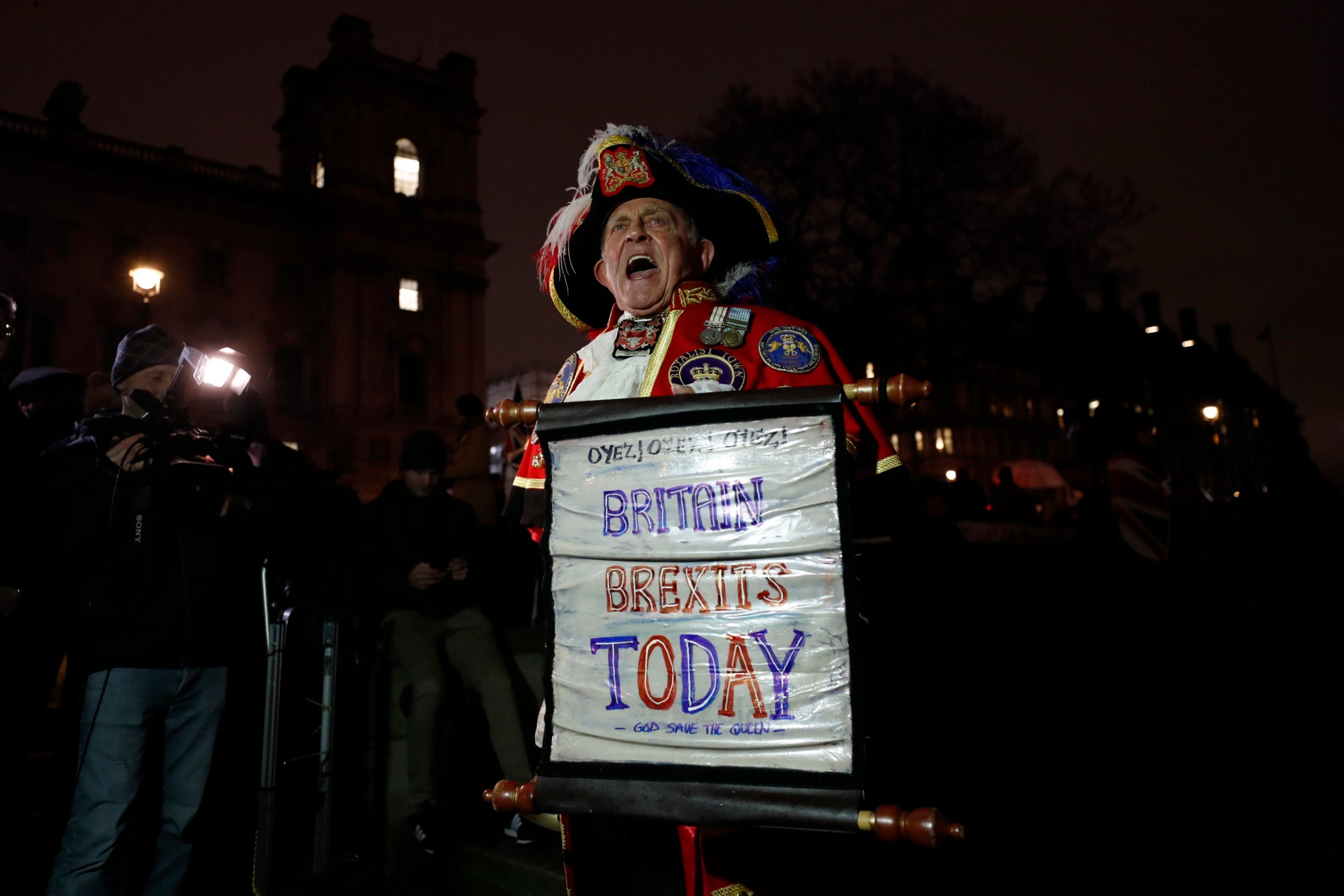
12/66
A Brexit supporter shouts during a rally in London
AP
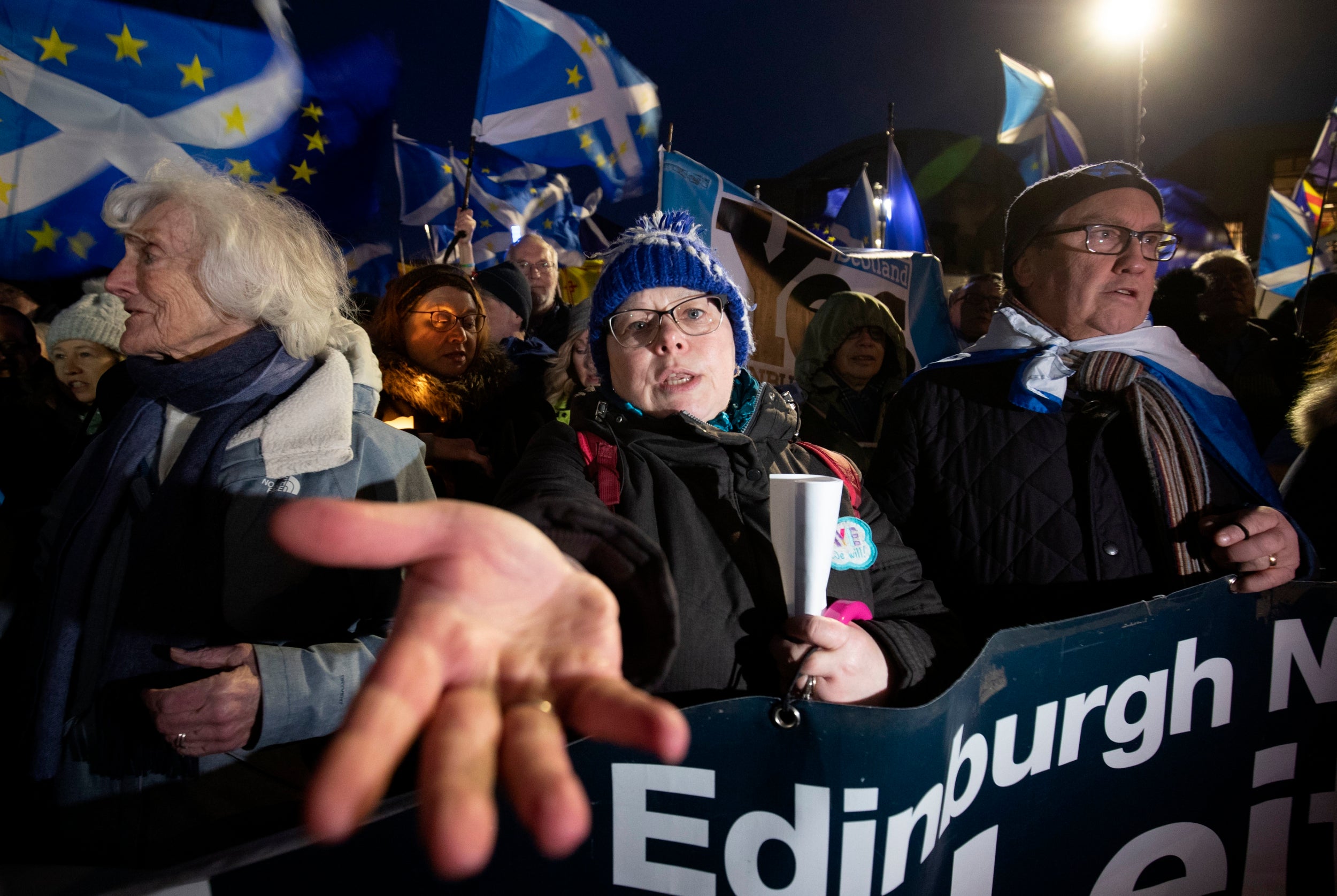
13/66
Pro-EU campaigners outside the Scottish Parliament, Edinburgh
PA
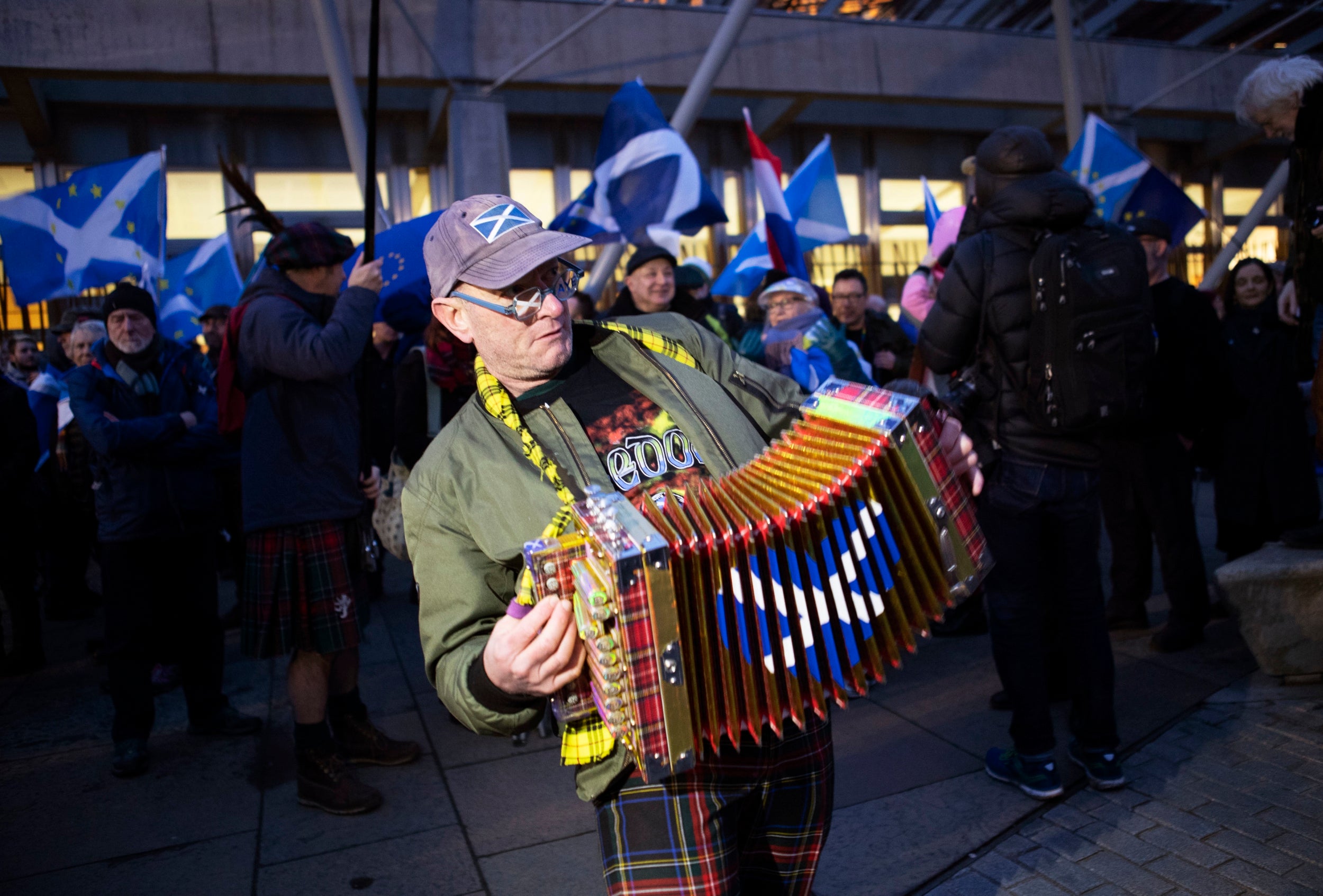
14/66
Pro-EU campaigners take part in a ‘Missing EU Already’ rally outside the Scottish Parliament, Edinburgh
PA
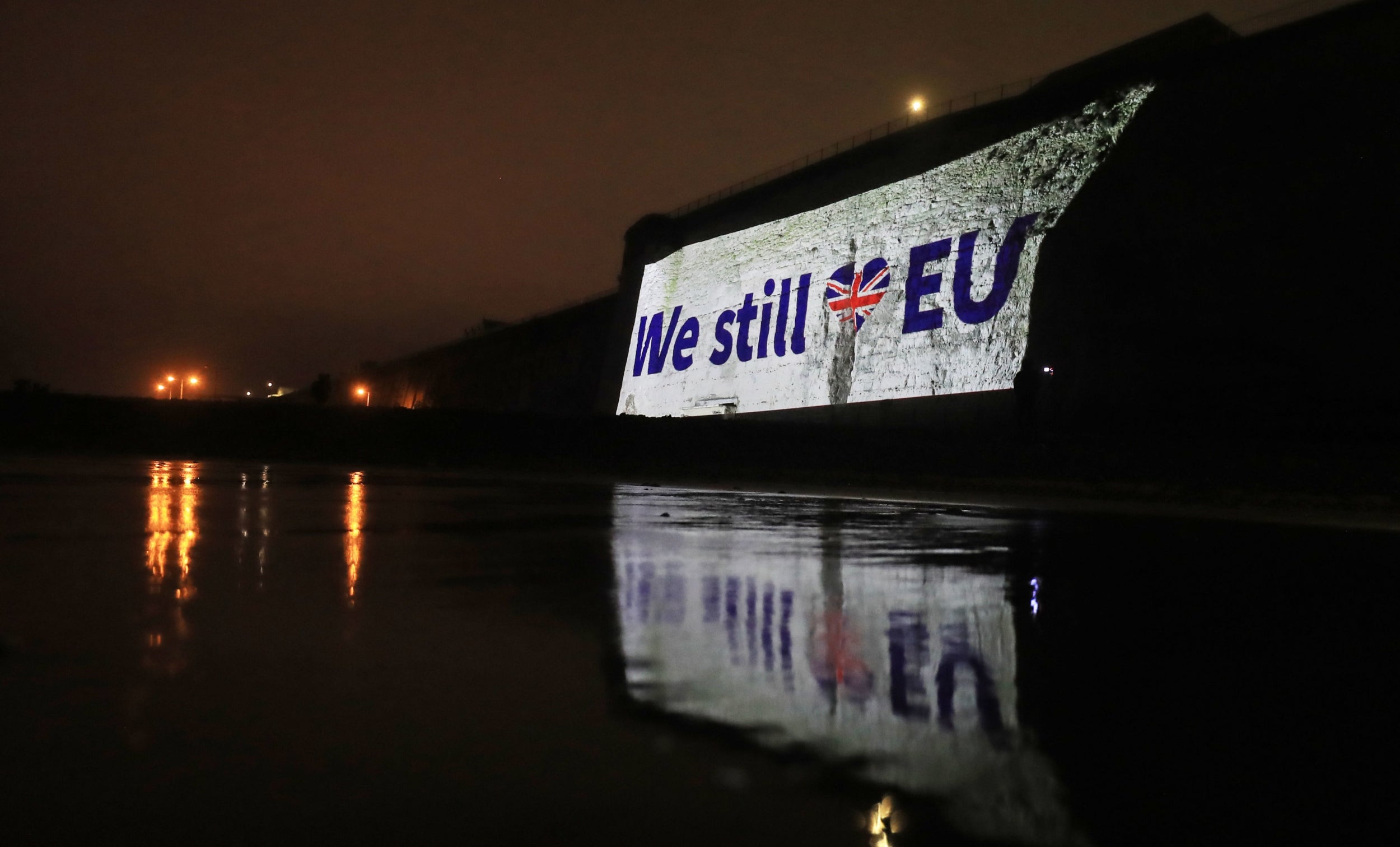
15/66
A large pro-EU banner is projected onto Ramsgate cliff in Kent
PA

16/66
Pro-EU supporters light candles in Smith Square in Westminster
PA

17/66
A man waves Union flags from a small car as he drives past Brexit supporters gathering in Parliament Square
AFP via Getty Images
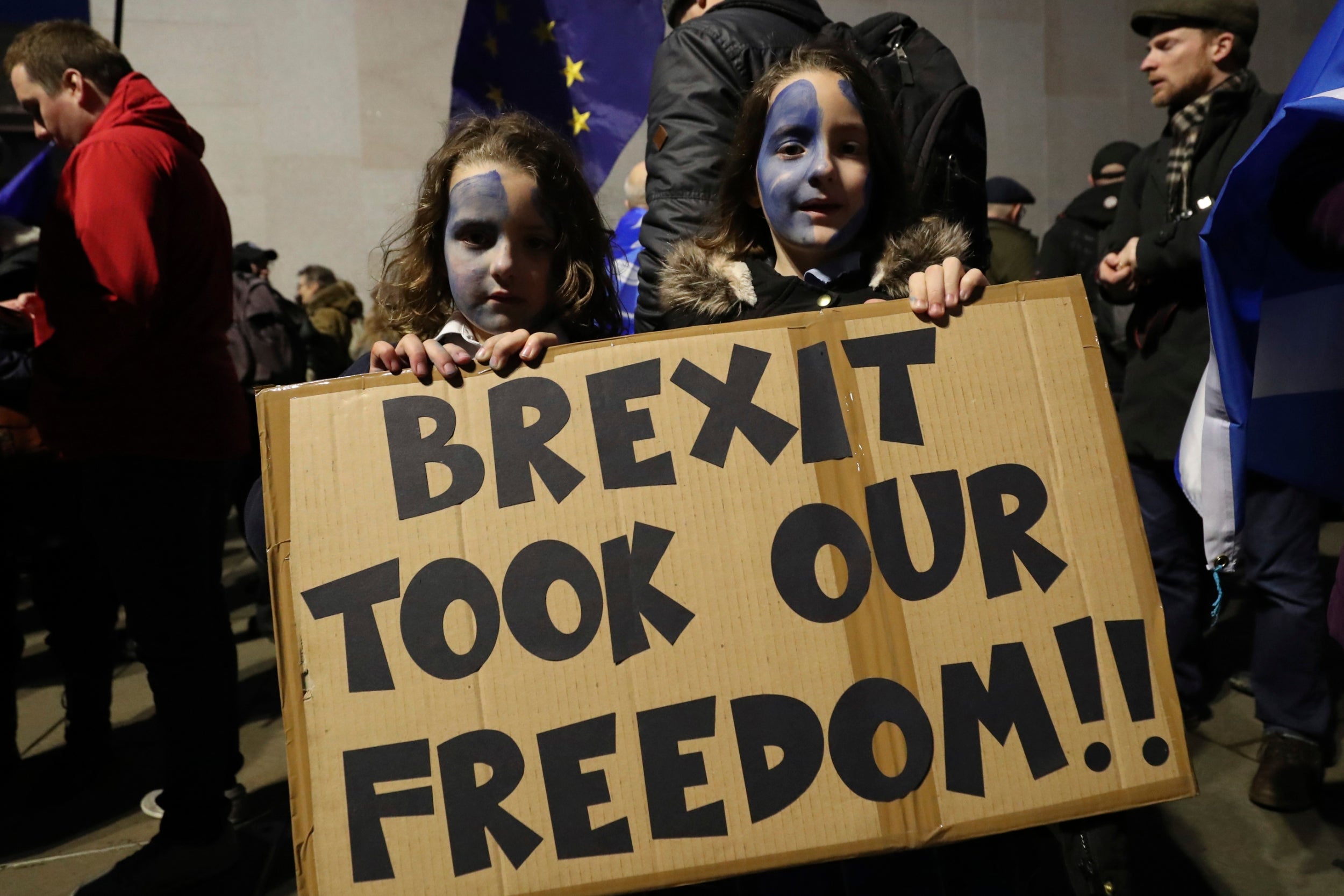
18/66
The five-year old Elisa Saemann, left, and her seven-year old sister Katie hold a placard during a rally by anti-Brexit protesters outside the Scottish parliament in Edinburgh
AP
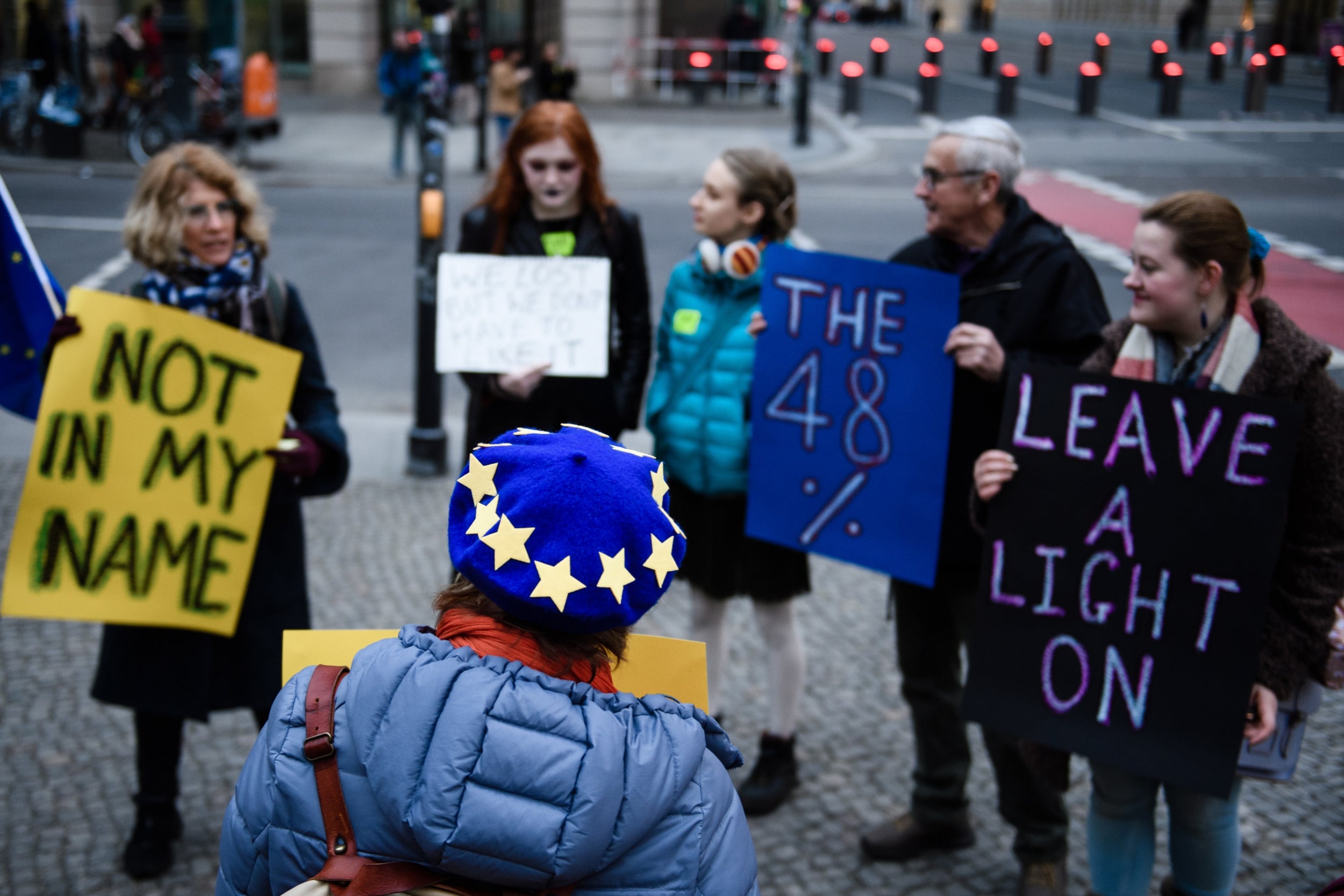
19/66
Pro Europe supporters gather on Brexit day near the British embassy in Berlin, Germany
EPA

20/66
Anti-Brexit protester hugs a man while holding a placard
REUTERS
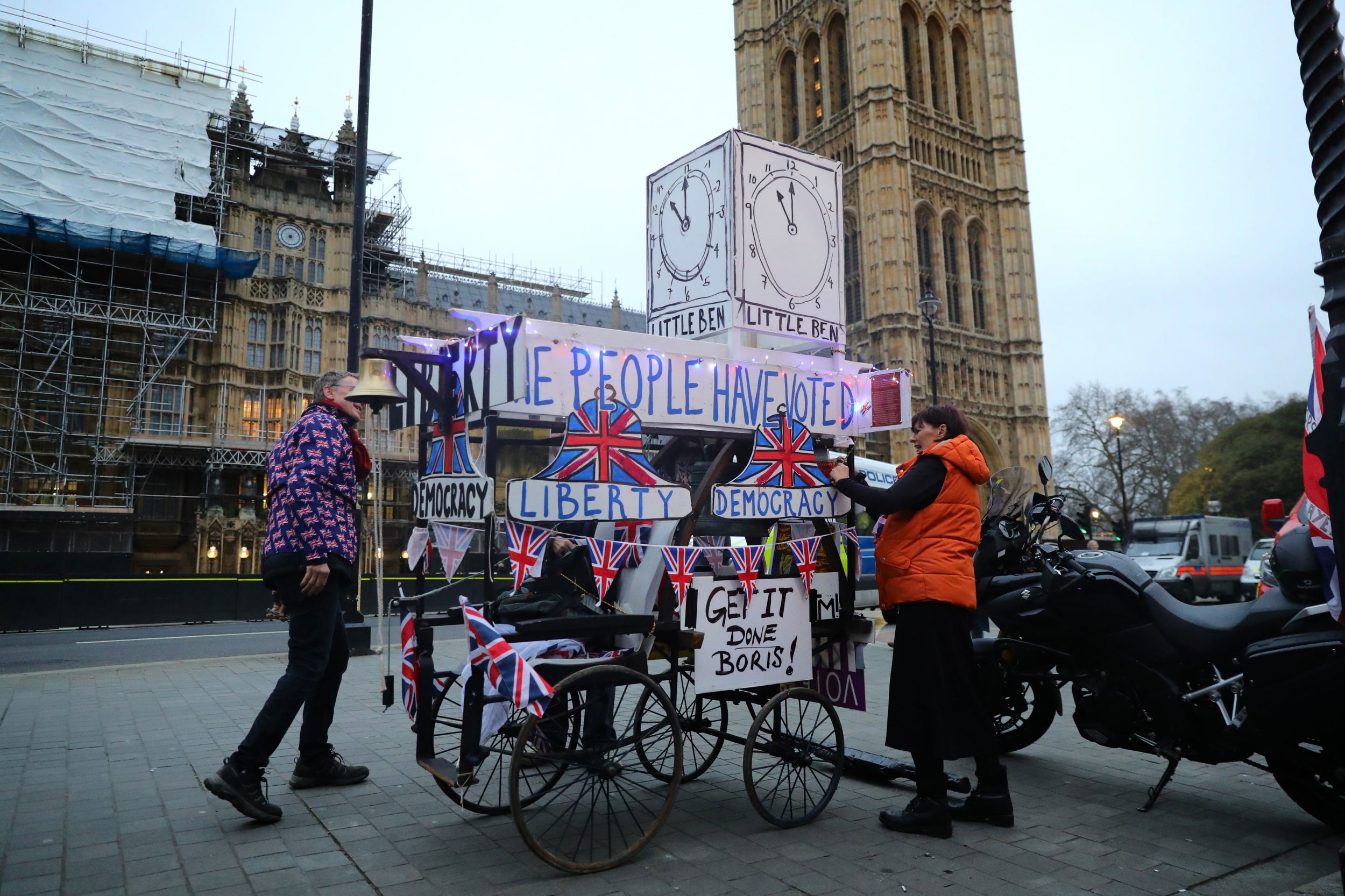
21/66
A decorated, old fashioned fire pump in Parliament Square
PA
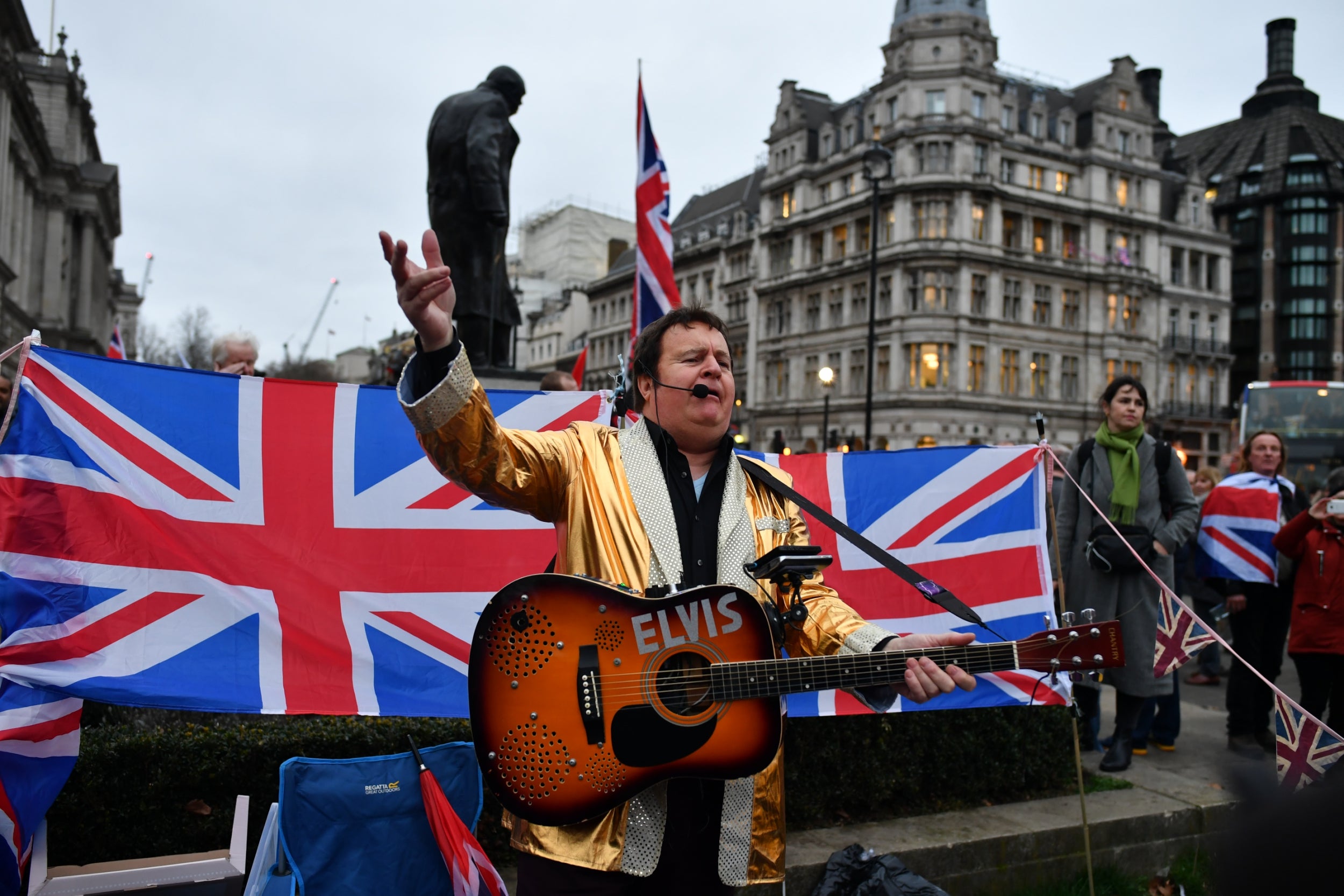
22/66
Pro Brexit Elvis impersonator performs at Parliament Square
Getty Images
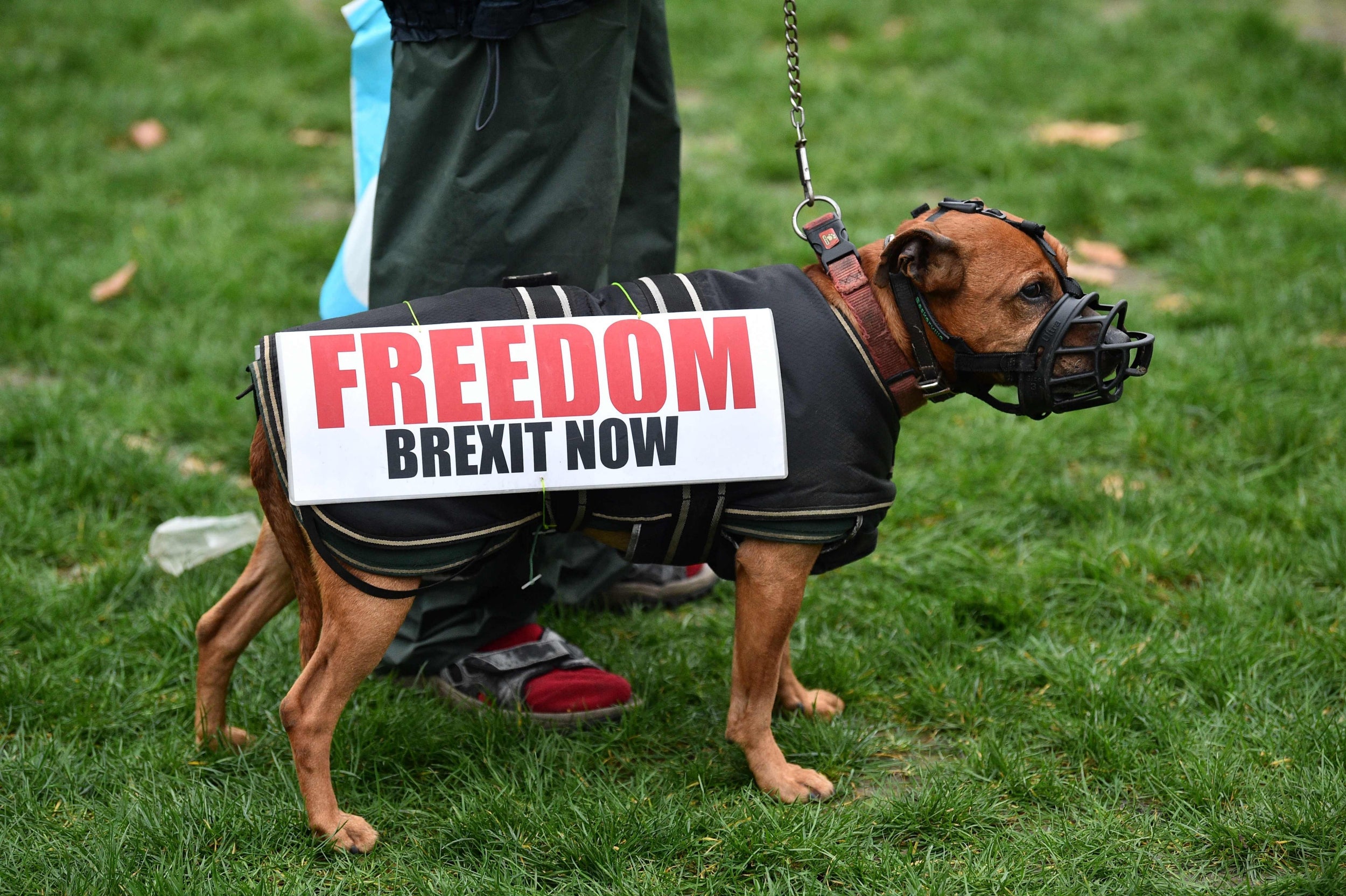
23/66
An anti-Brexiteers stands with his dog in Parliament Square
AFP via Getty Images
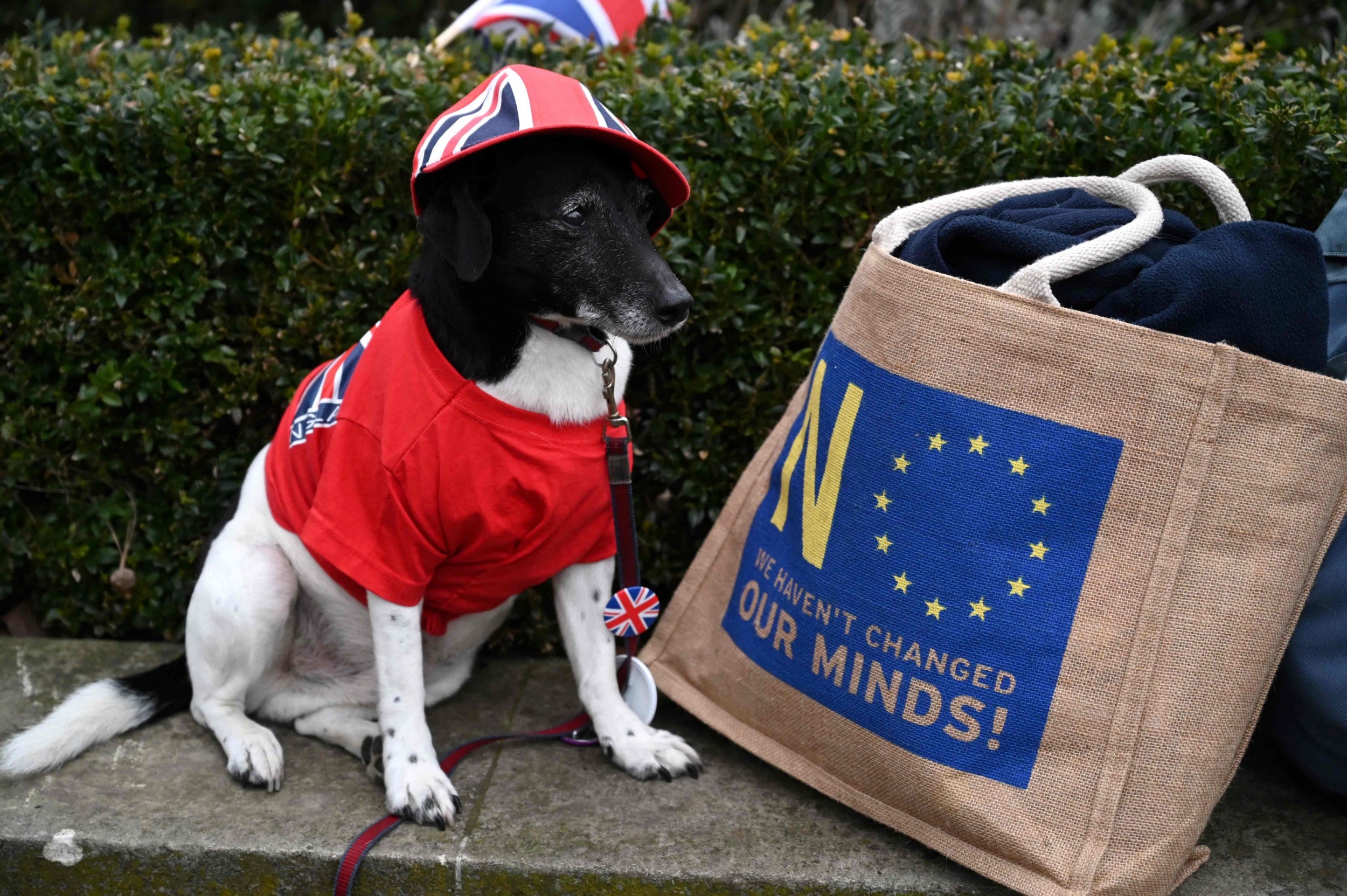
24/66
Paddy from Bournemouth wears Union colours as he sits next to an EU flag decorated bag in Parliament Square
AFP via Getty Images
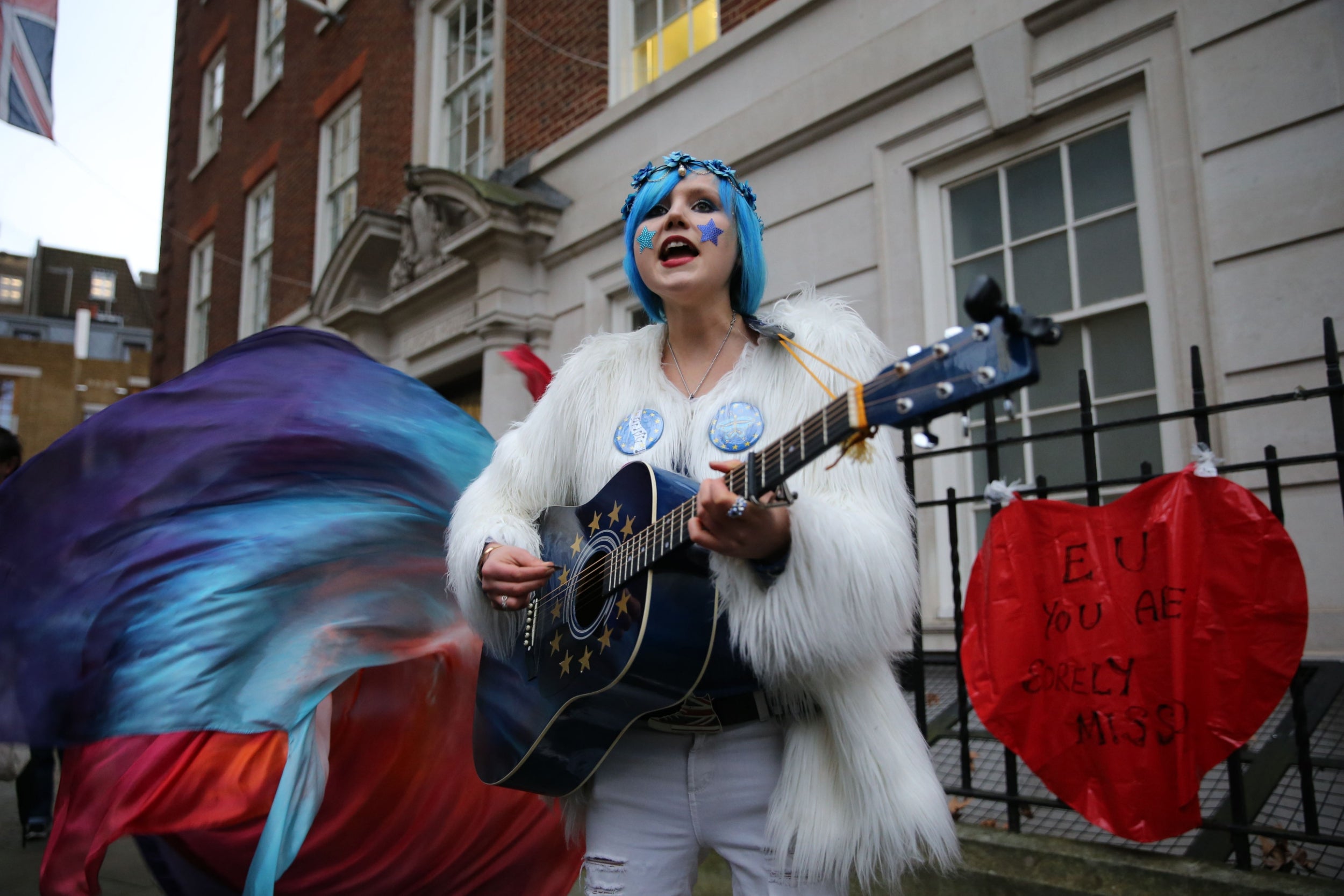
25/66
A pro-EU activist plays a guitar decorated with the EU flag during a protest organised by civil rights group New Europeans outside Europe House, central London
AFP via Getty Images
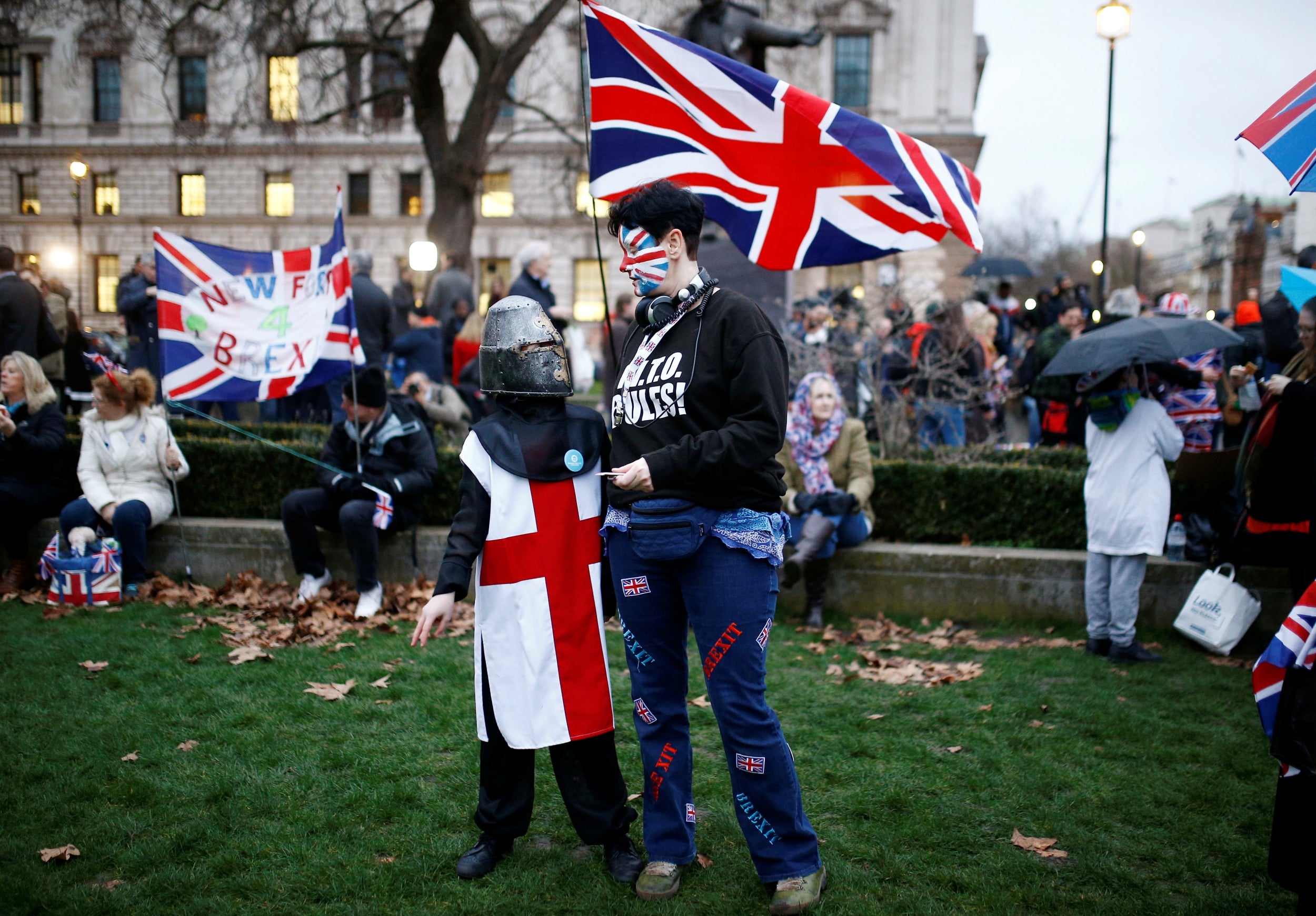
26/66
People celebrate Britain leaving the EU
REUTERS
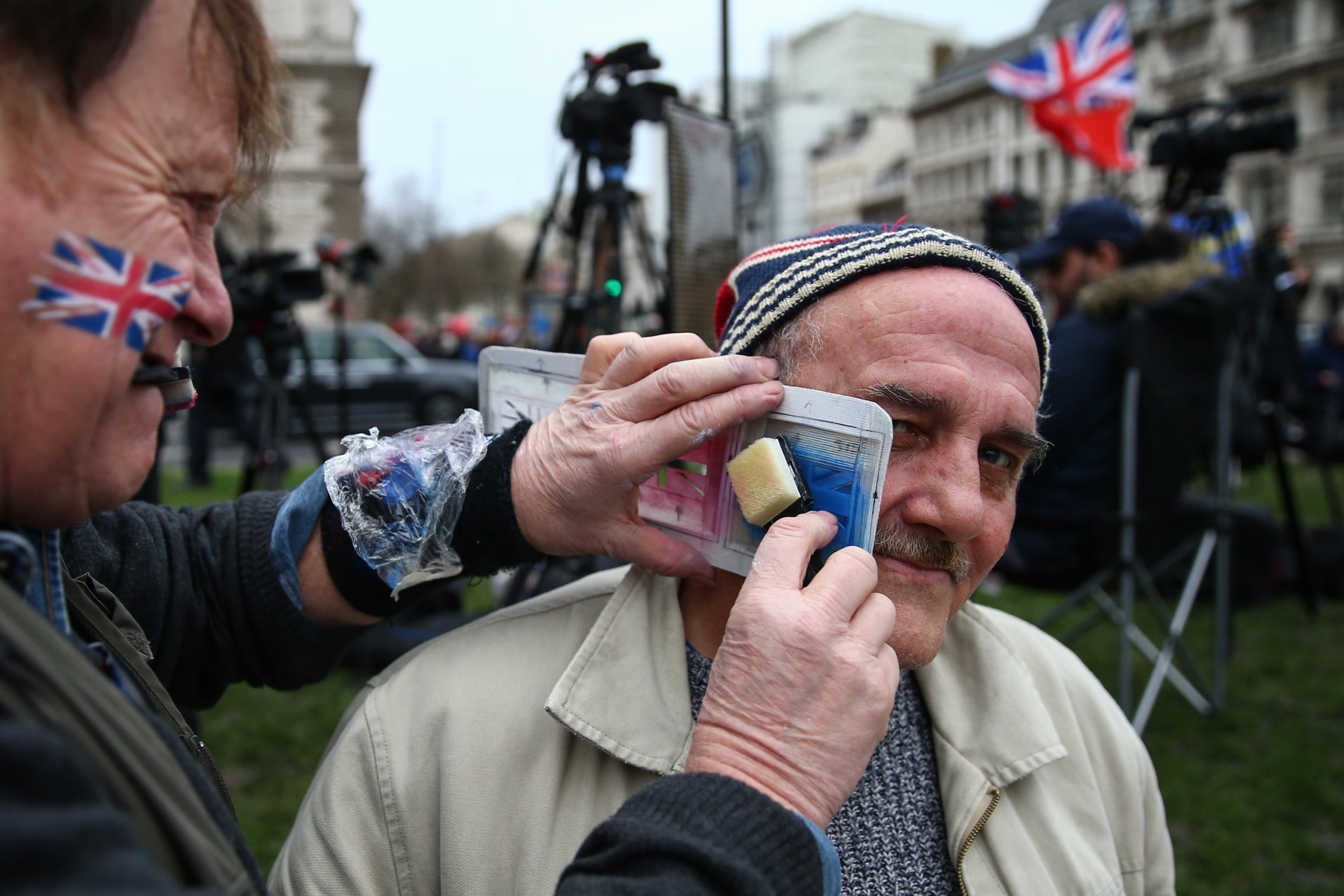
27/66
A Pro Brexit supporter has a Union Jack painted onto his face at Parliament Square
Getty Images
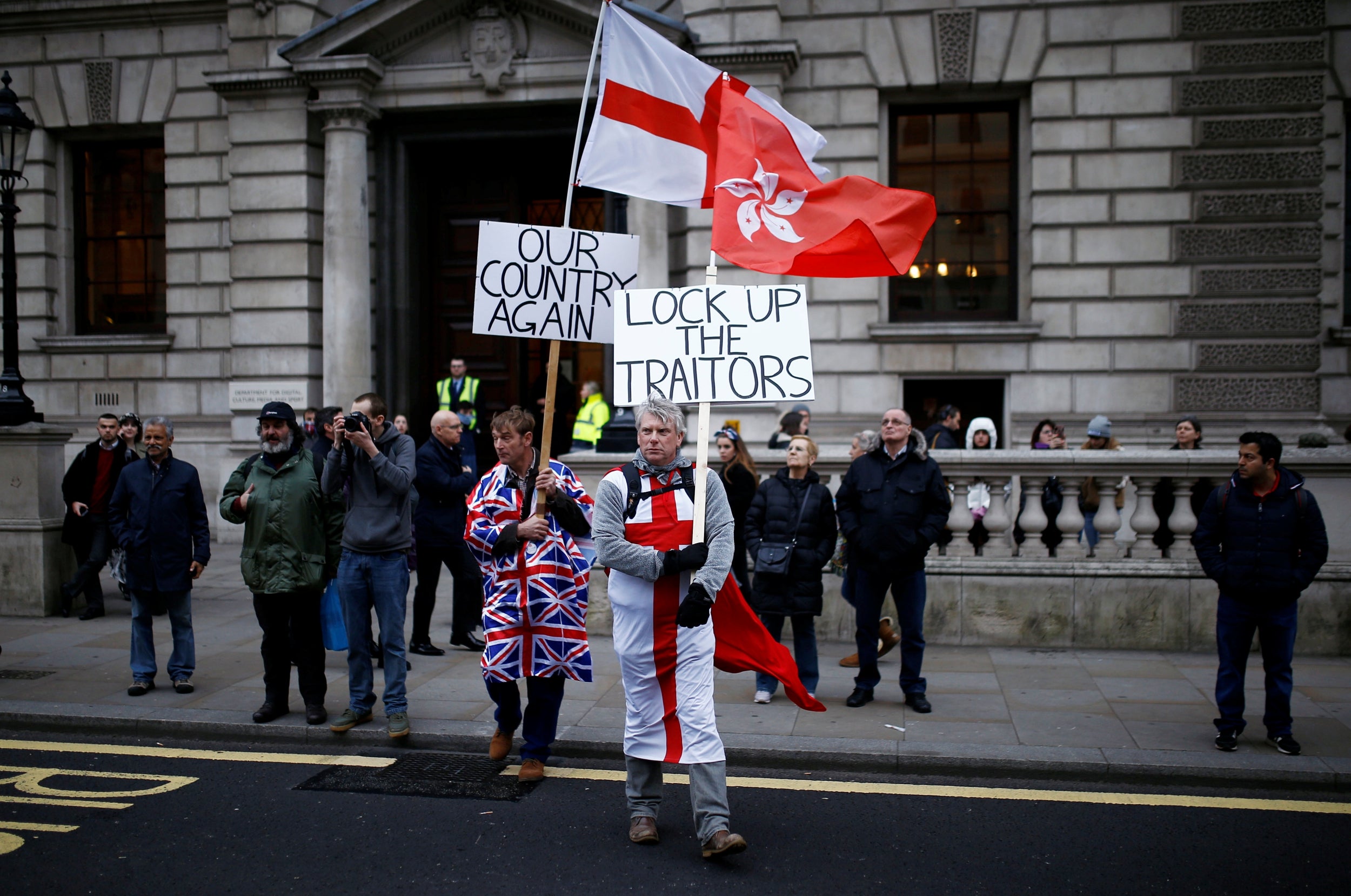
28/66
Men hold placards celebrating Britain leaving the EU
REUTERS
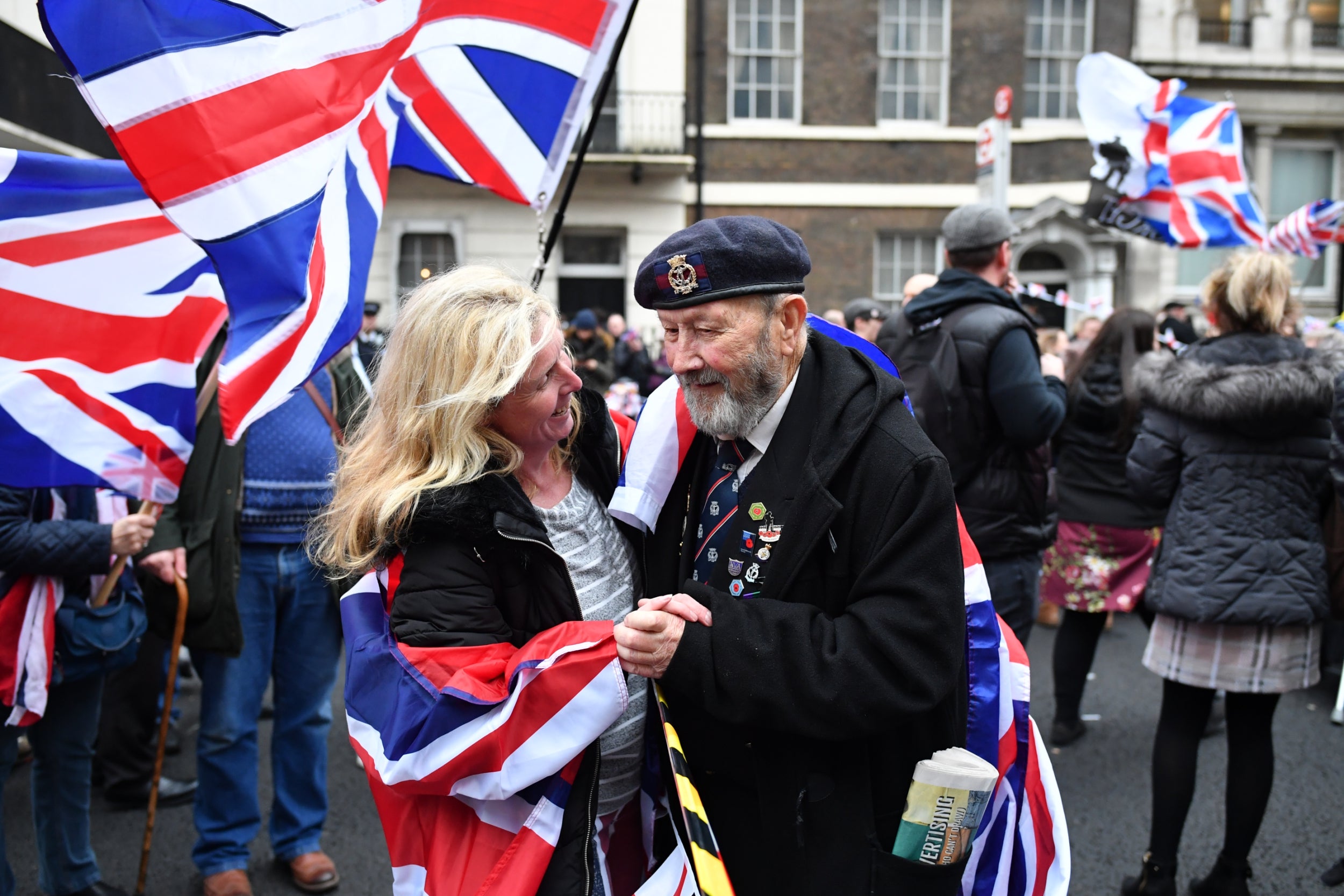
29/66
Pro Brexit supporters dance in the street draped with Union Jack flags at Parliament Square
Getty Images
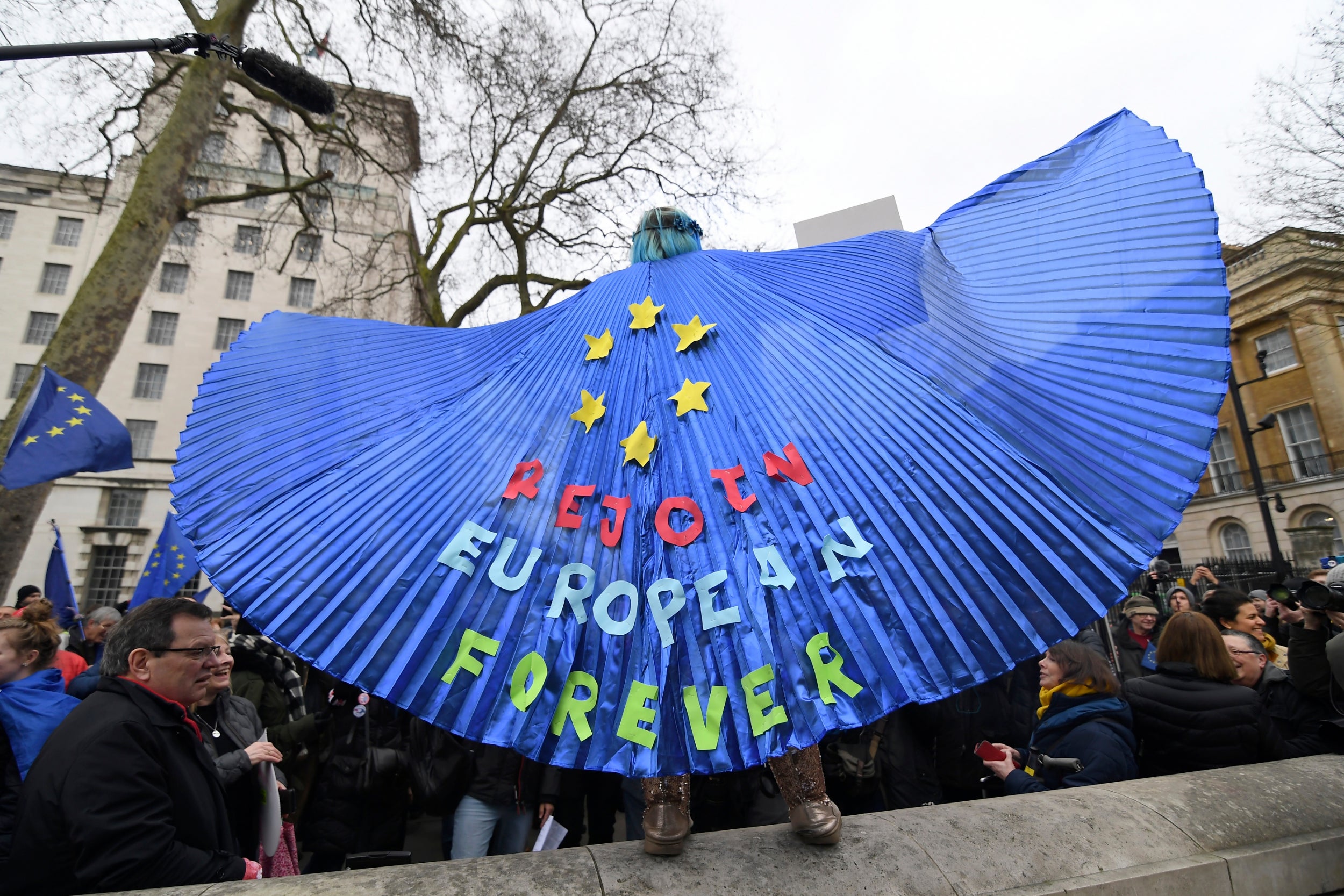
30/66
An anti-Brexit demonstrator spreads his wings during a gathering near Downing Street
AP

31/66
Pro EU supporters display a banner ‘ Here to Stay, Here to Fight, Migrants In, Tories Out’ from Westminster bridge
EPA
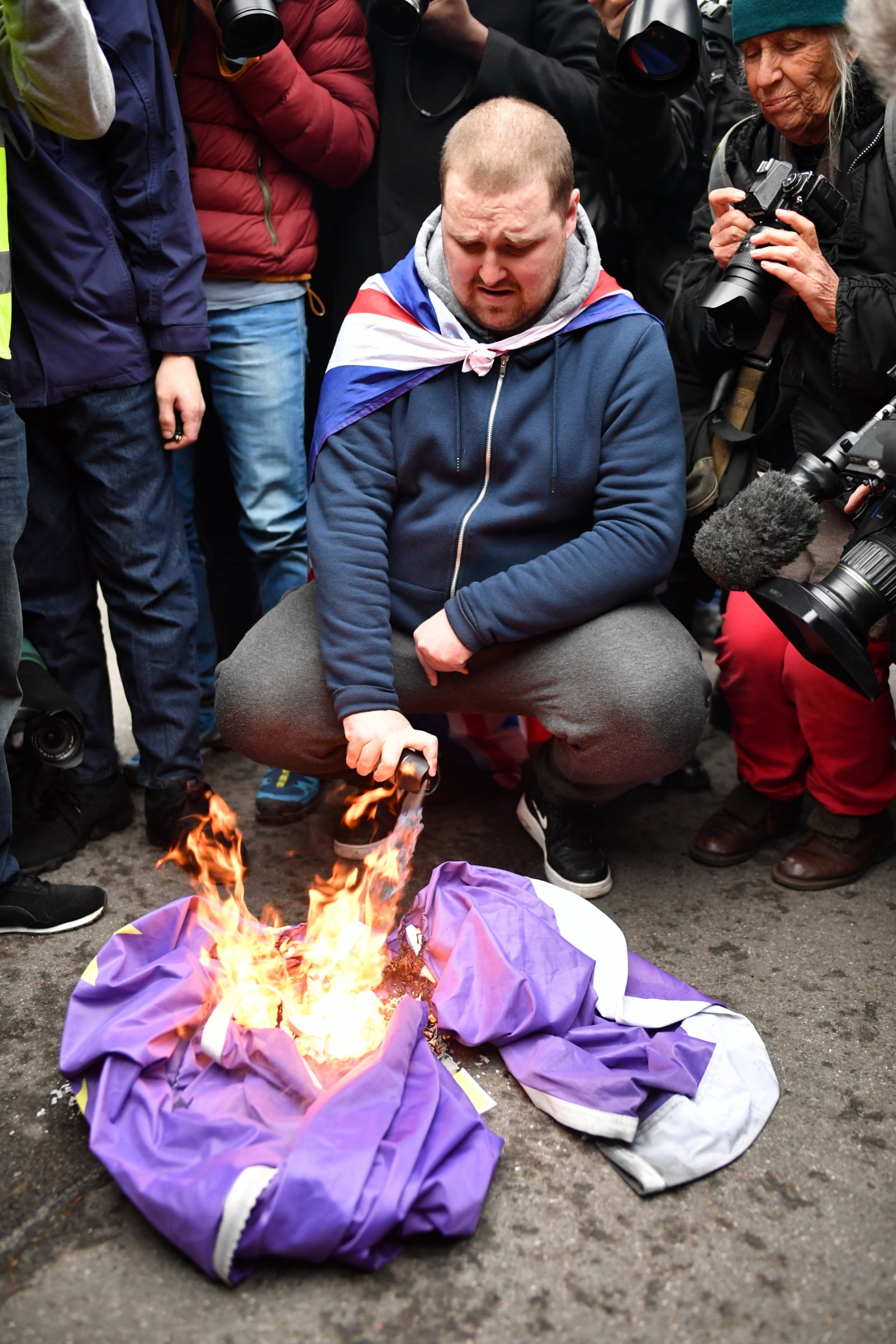
32/66
Pro-Brexit supporters burn European Union flags at Parliament Square
Getty
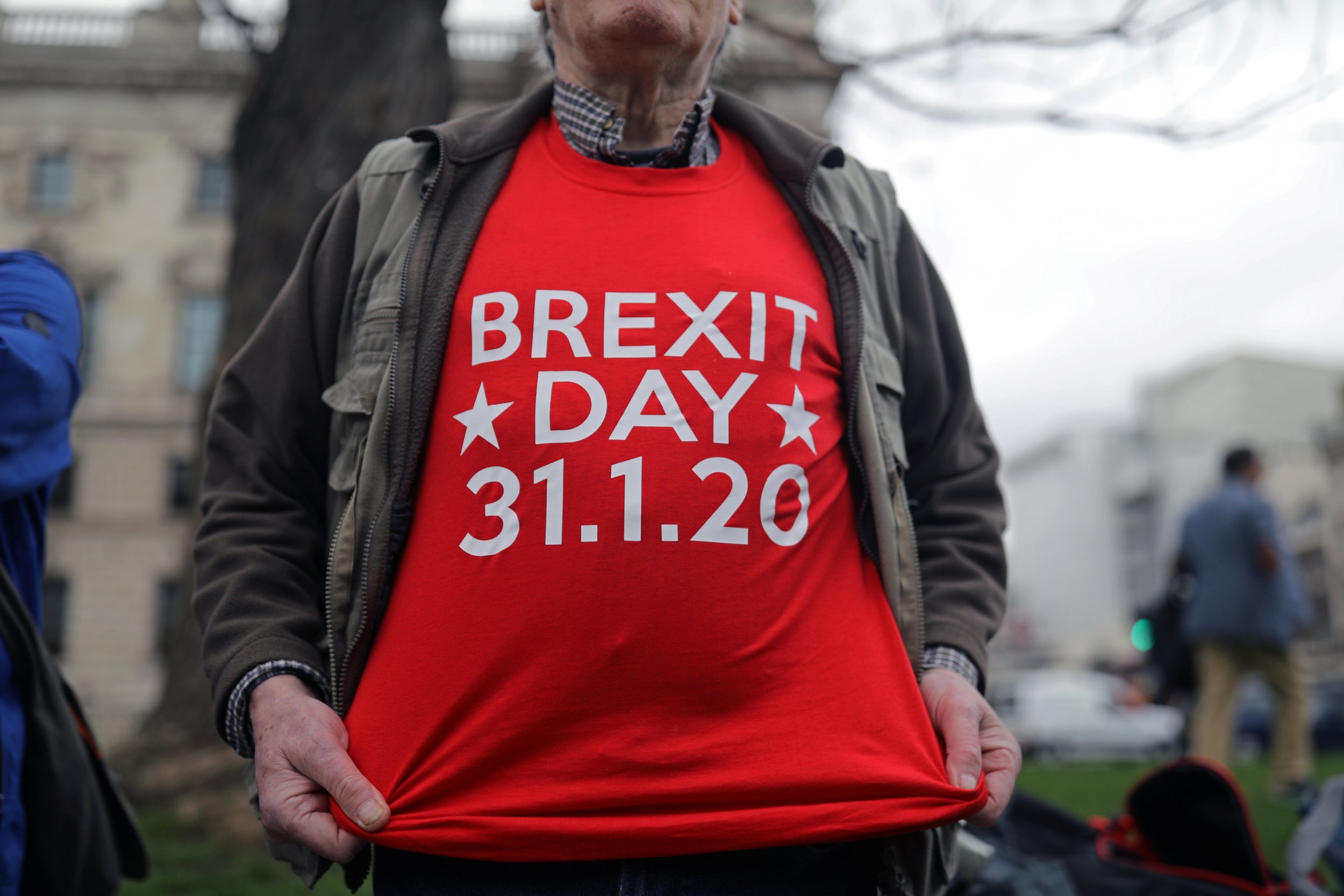
33/66
A man poses for a picture on Parliament Square in a ‘Brexit Day’ t-shirt
Reuters
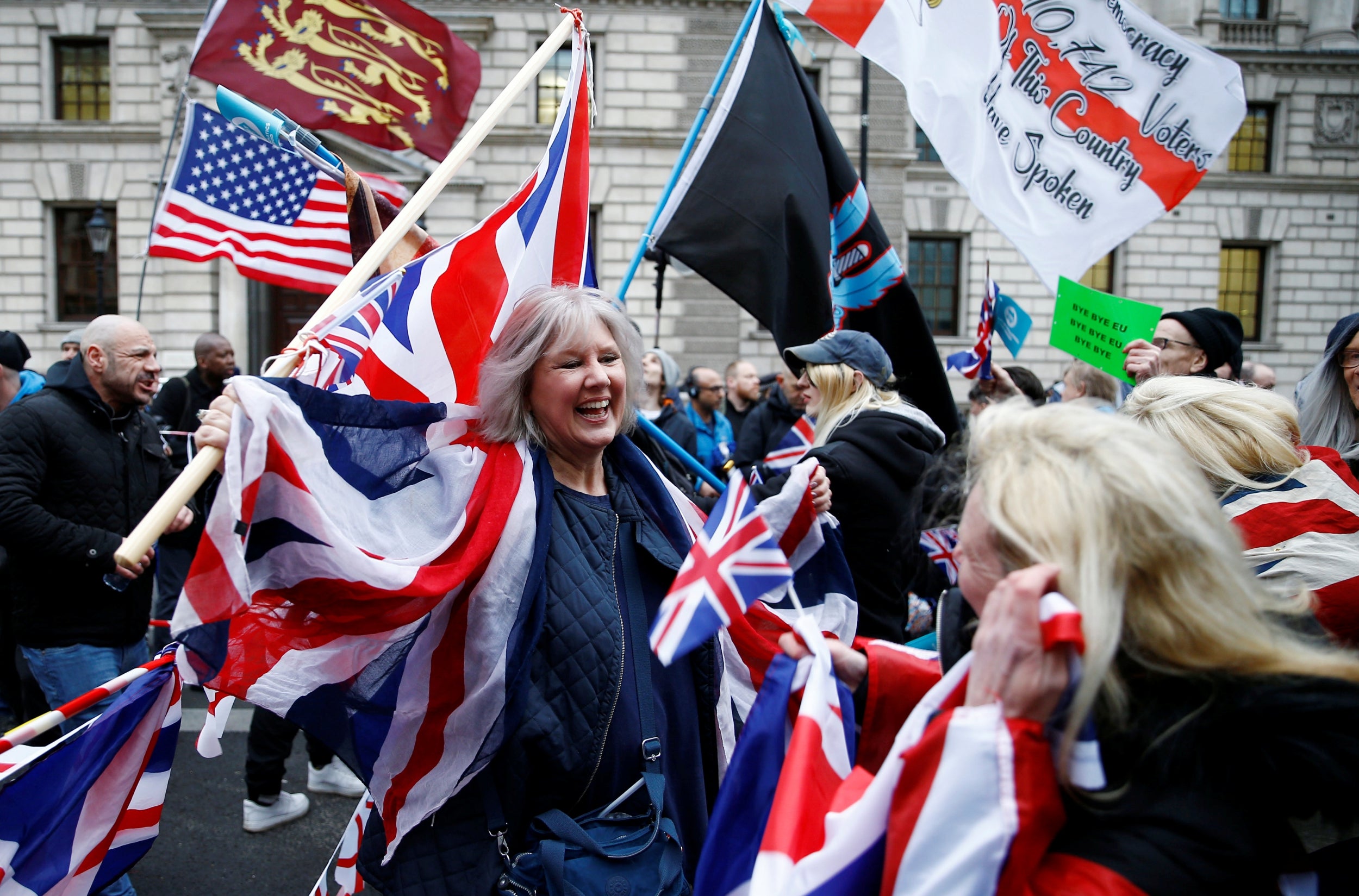
34/66
People celebrate Britain leaving the EU
Reuters
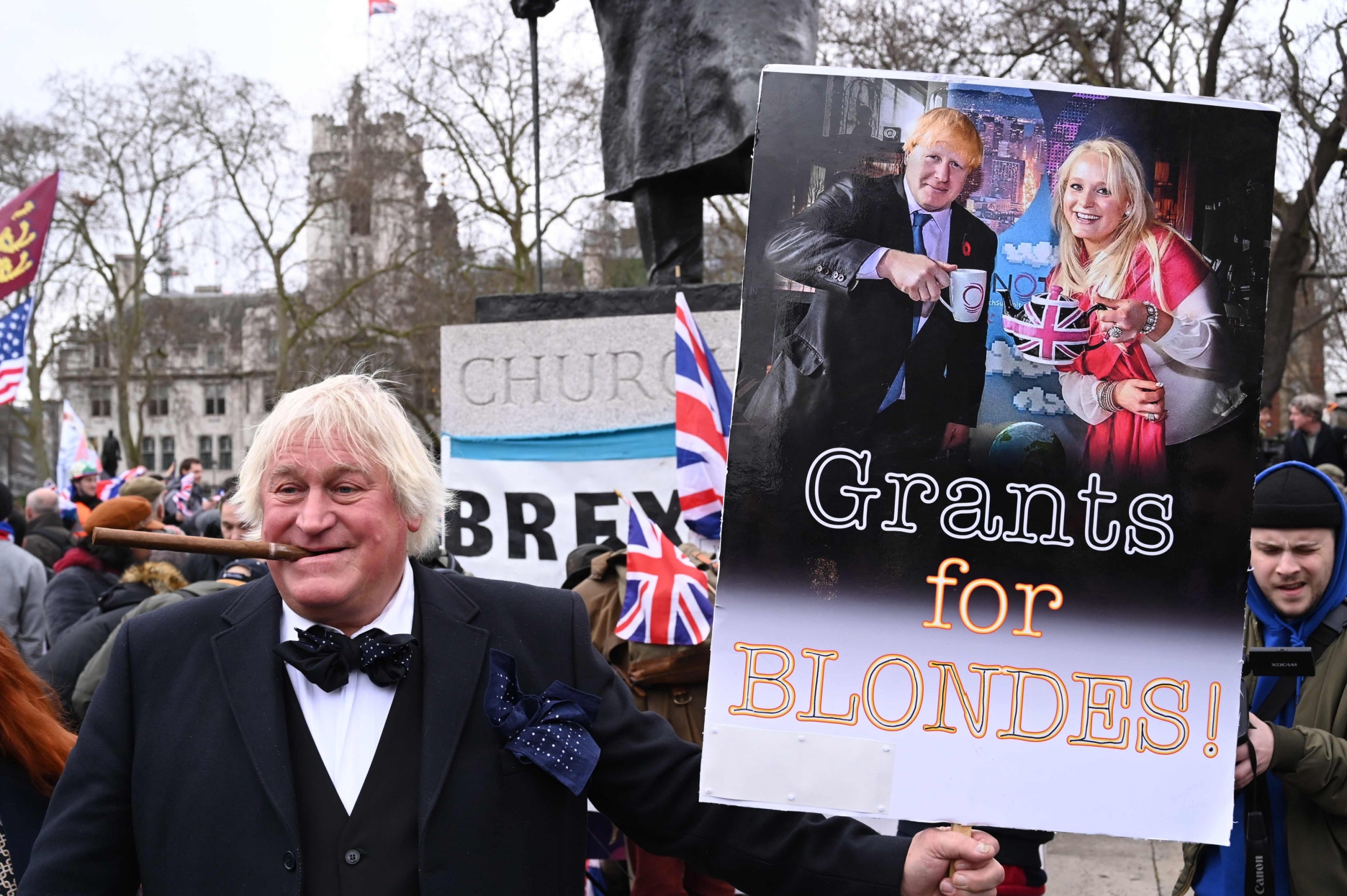
35/66
AFP via Getty
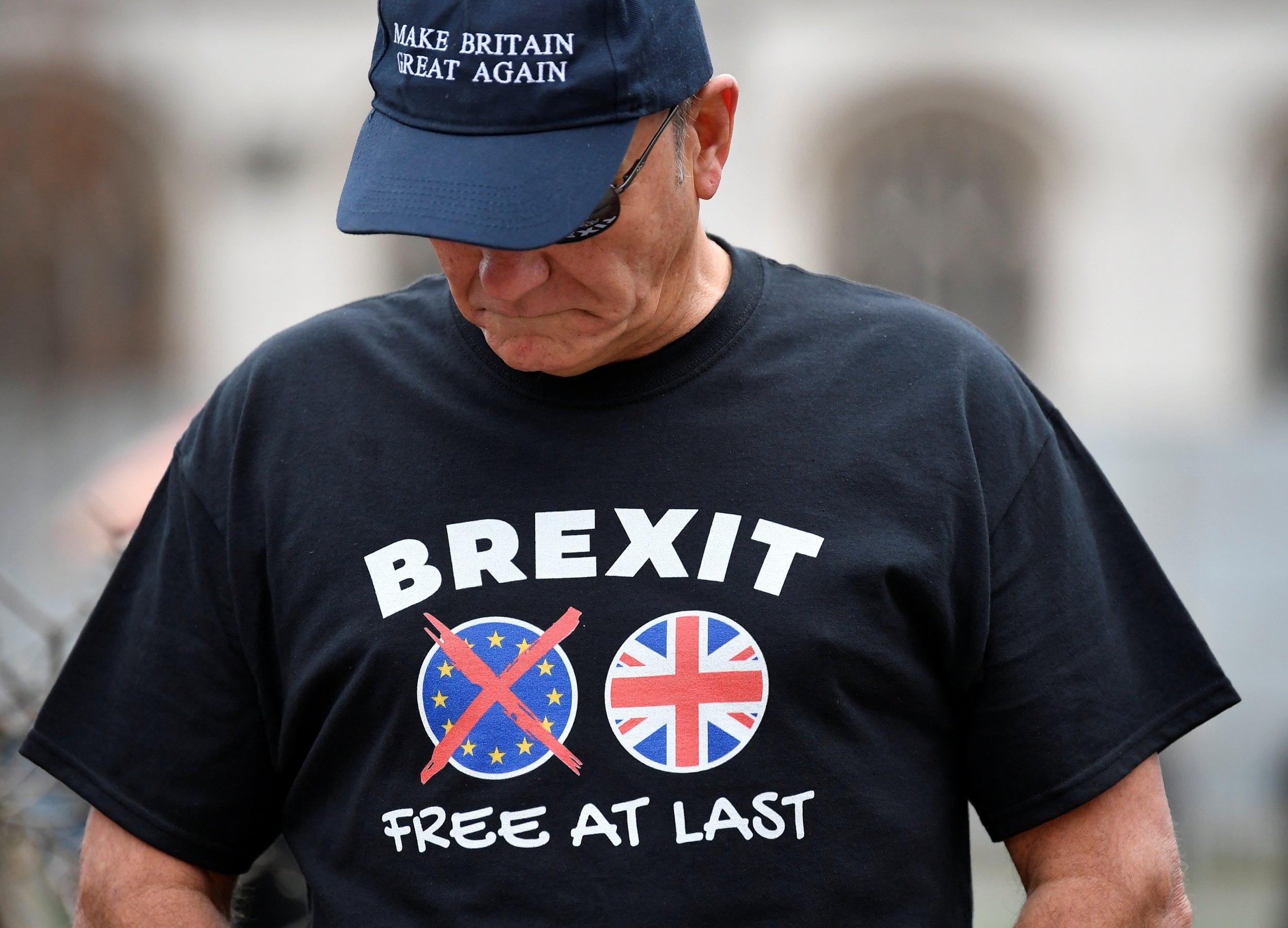
36/66
A man wears a pro-Brexit t-shirt
Reuters
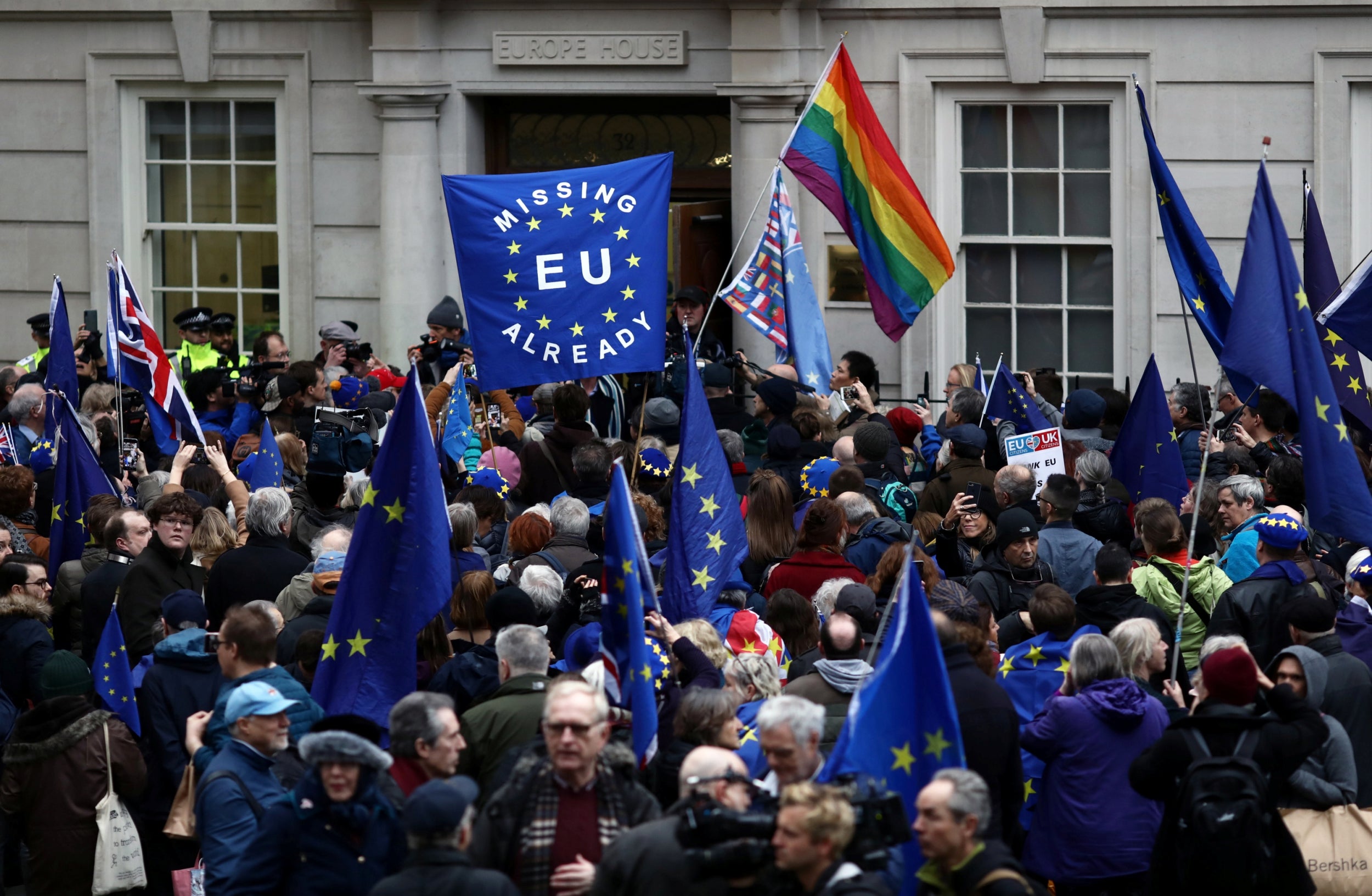
37/66
Anti-Brexit demonstrators visit Europe House to give flowers to the staff on Brexit day
Reuters
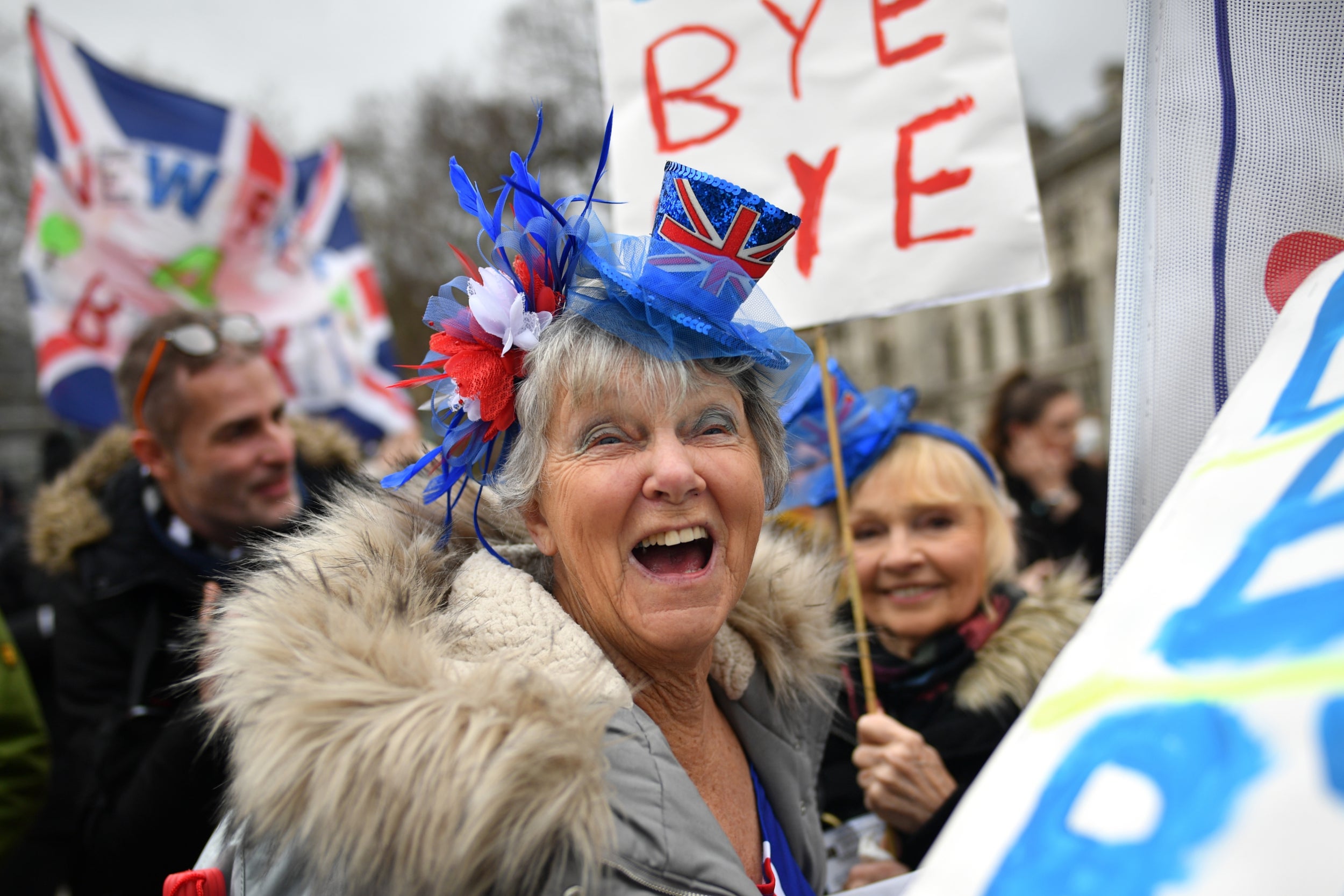
38/66
Pro Brexit supporter wears a novelty Union Jack top hat outside the Houses of Parliament
Getty Images

39/66
Customers Scott Jones and Laura Jones at the Sawmill Bar in South Elmsall, Yorkshire, where a Brexit party is being held throughout the day
PA
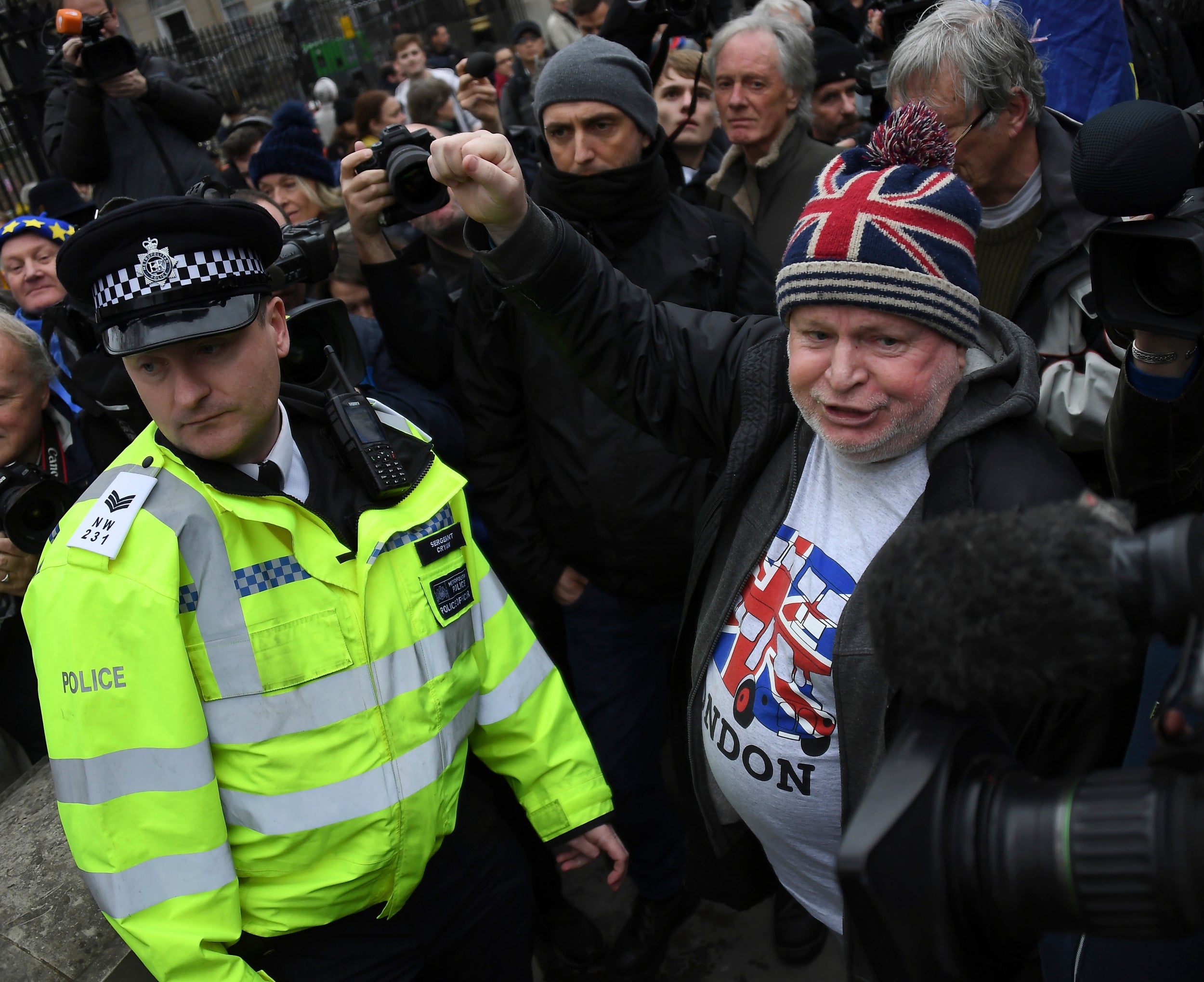
40/66
AP
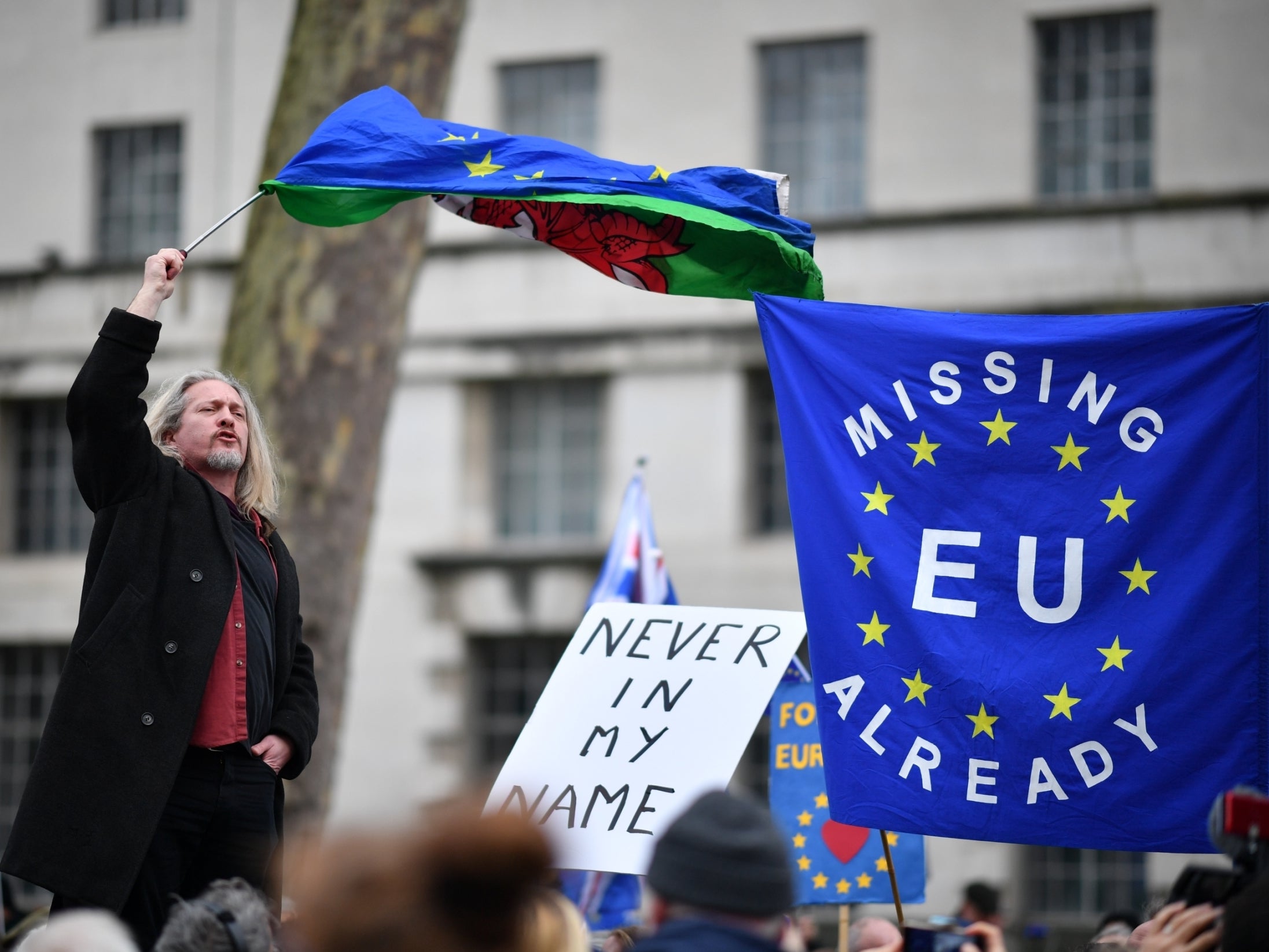
41/66
Getty Images

42/66
Getty Images
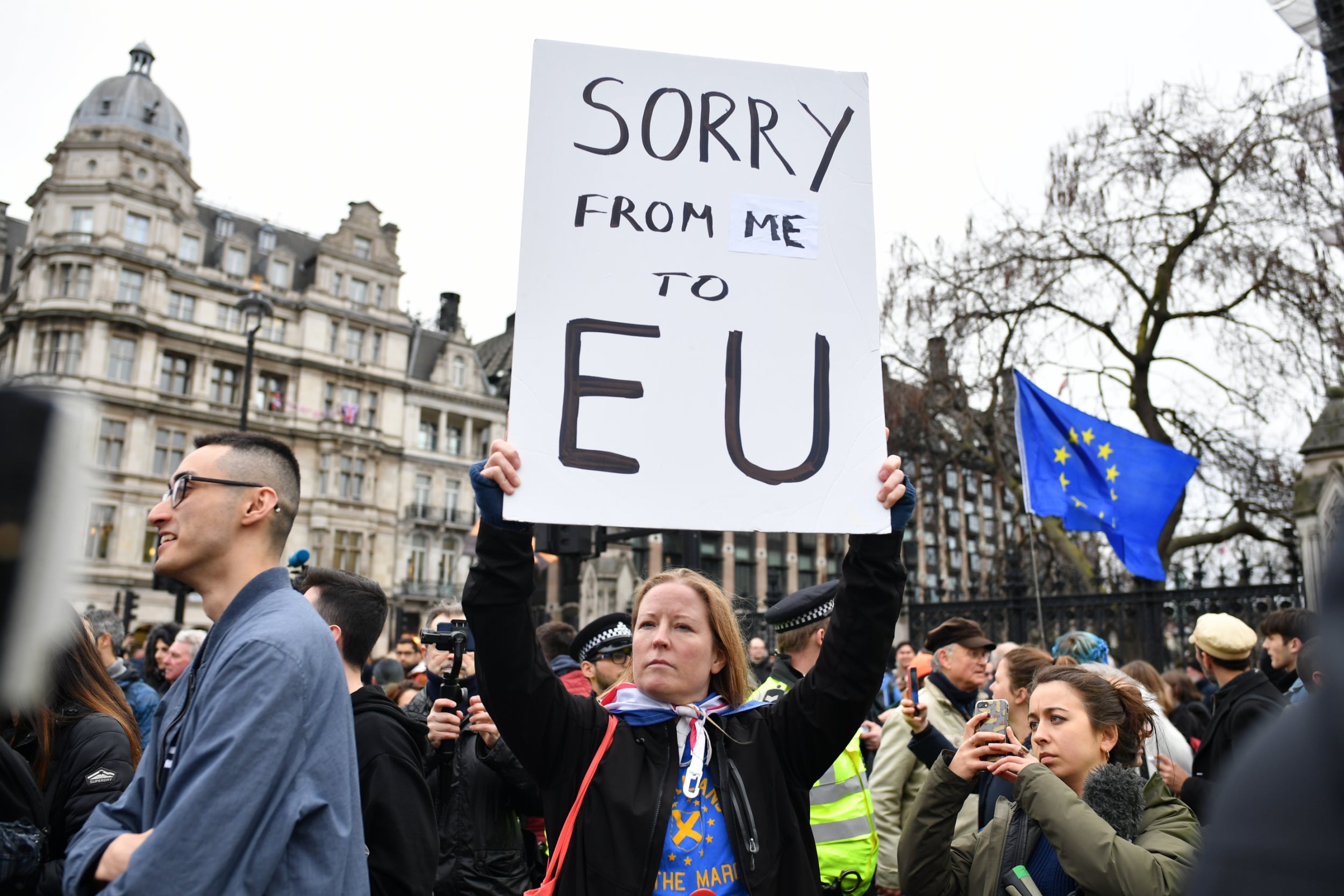
43/66
Pro-EU activists protest
Getty Images
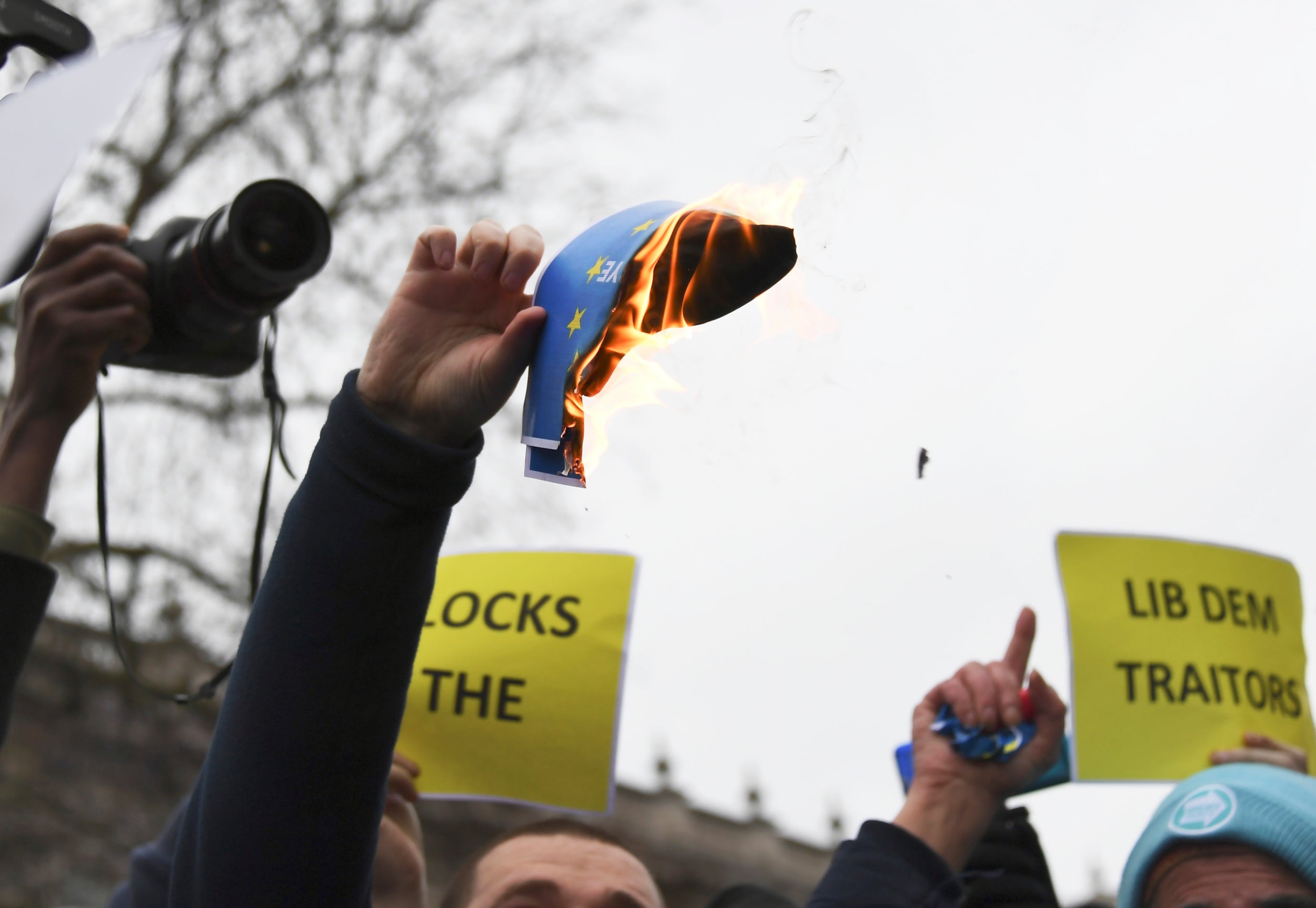
44/66
A pro-Brexit demonstrator burns a European Union flag
AP
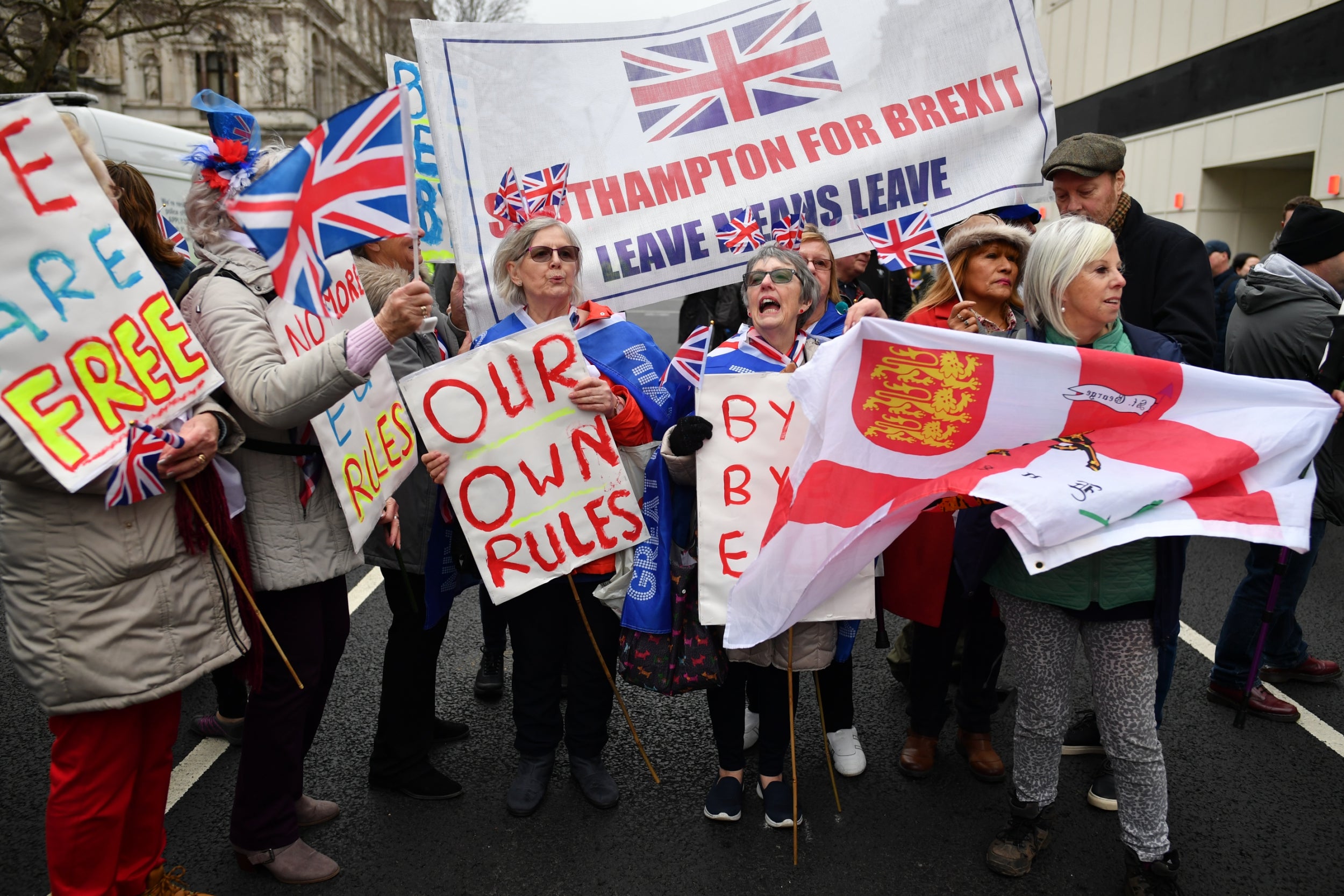
45/66
Pro Brexit supporters
Getty Images
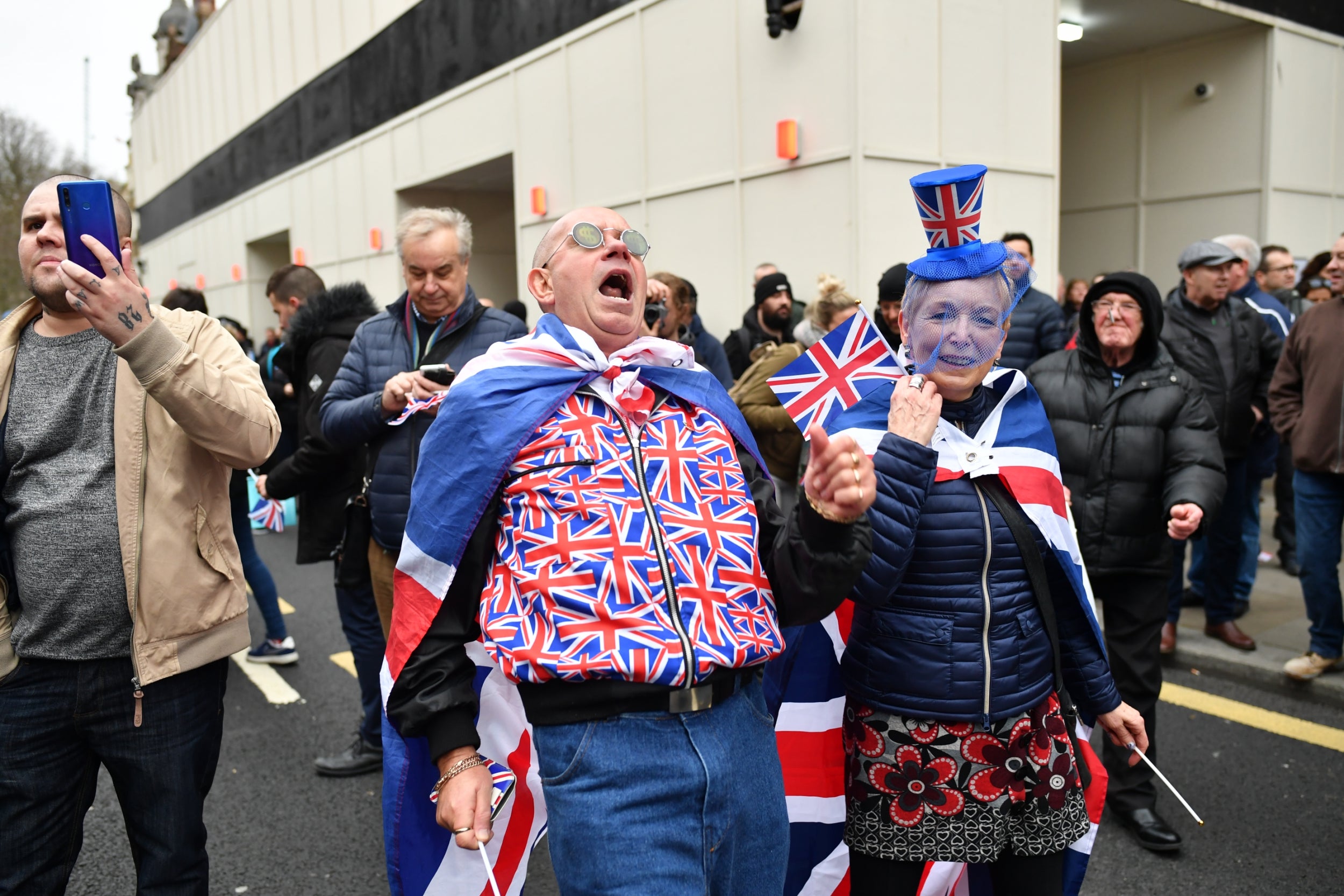
46/66
Pro Brexit supporters
Getty Images

47/66
A Brexit supports holds a sign in Parliament Square
AP
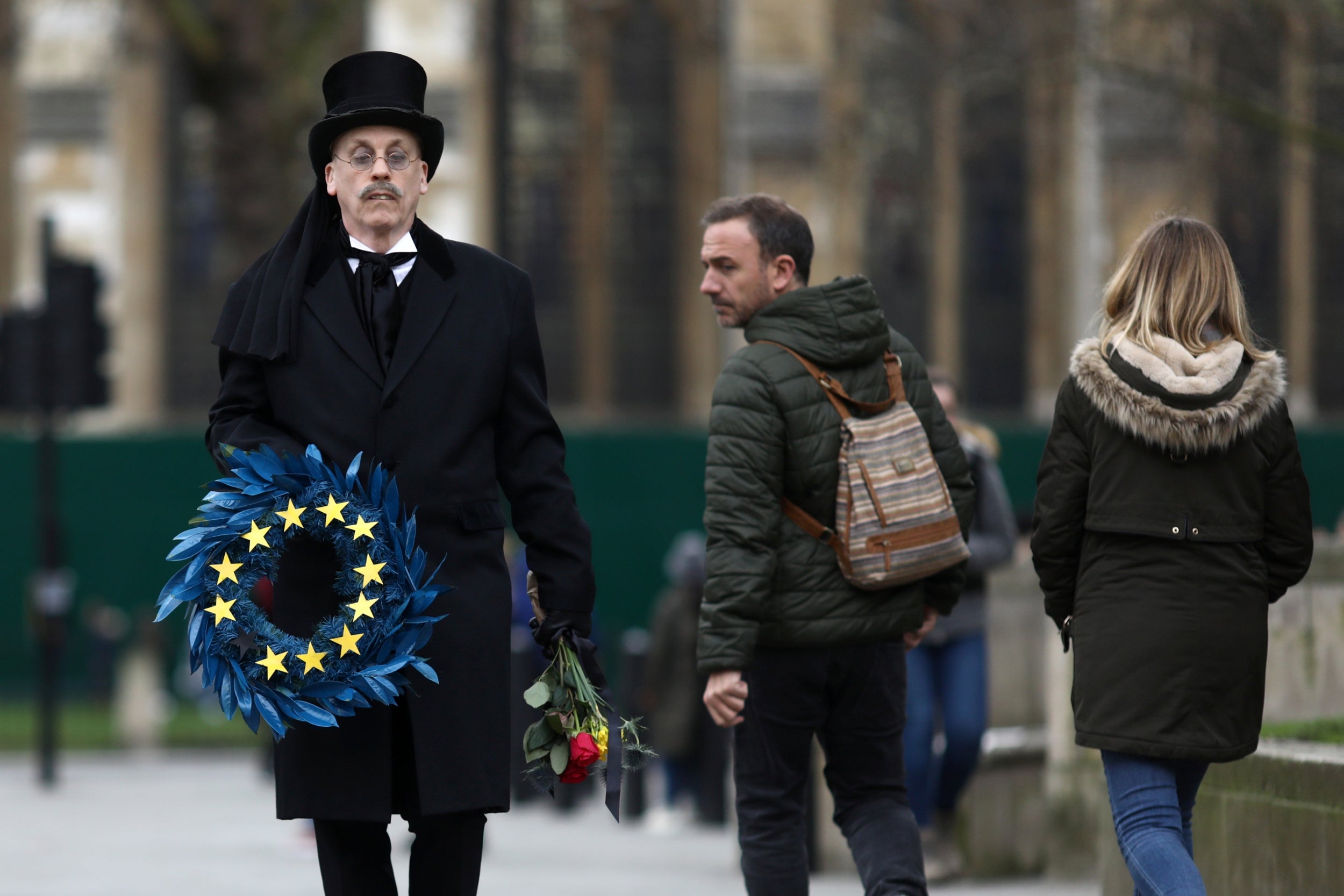
48/66
A man carries an EU themed wreath
Reuters
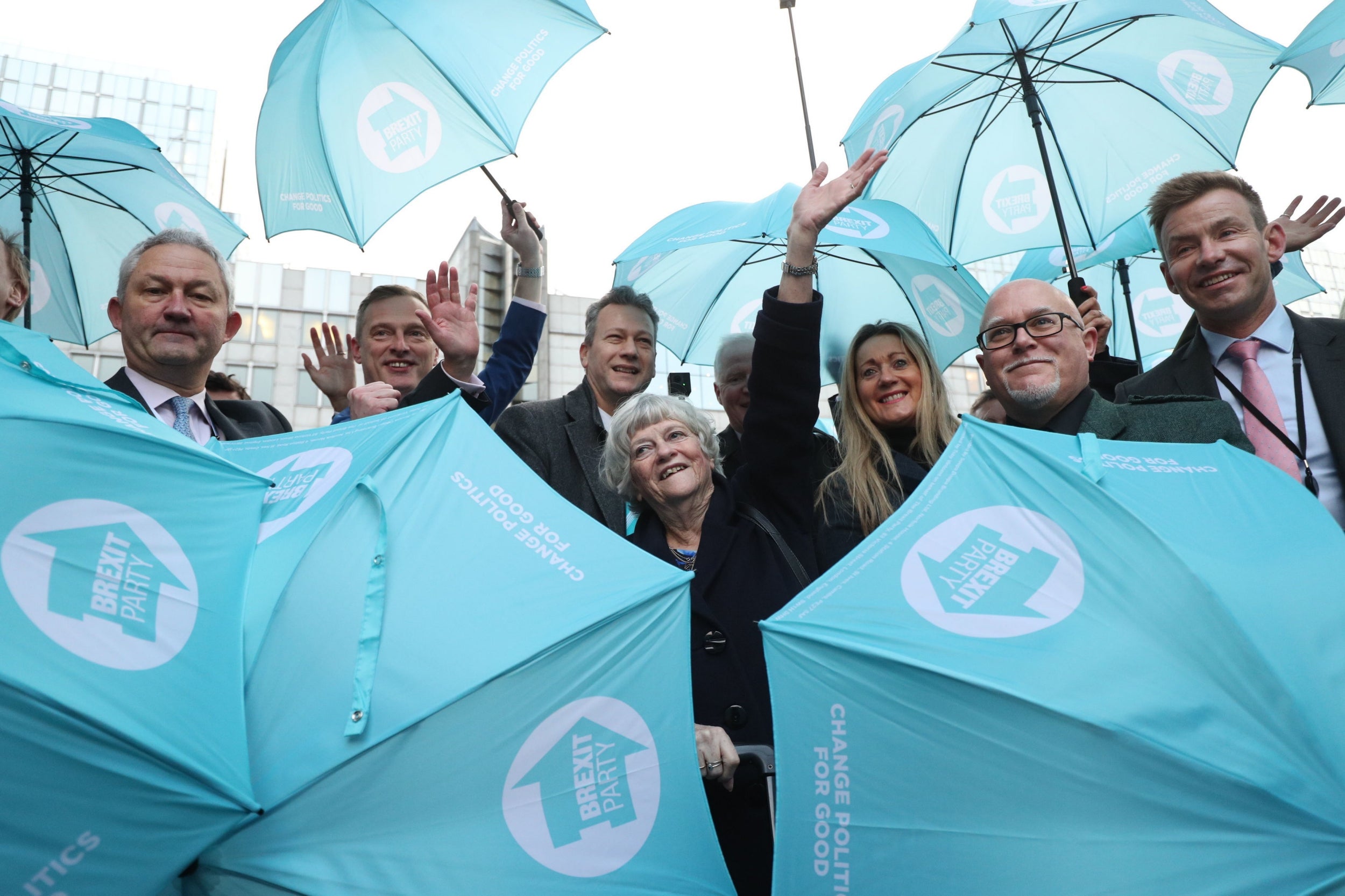
49/66
Ann Widdecombe reacts with other members of the Brexit party as they leave en masse from the European Parliament
PA
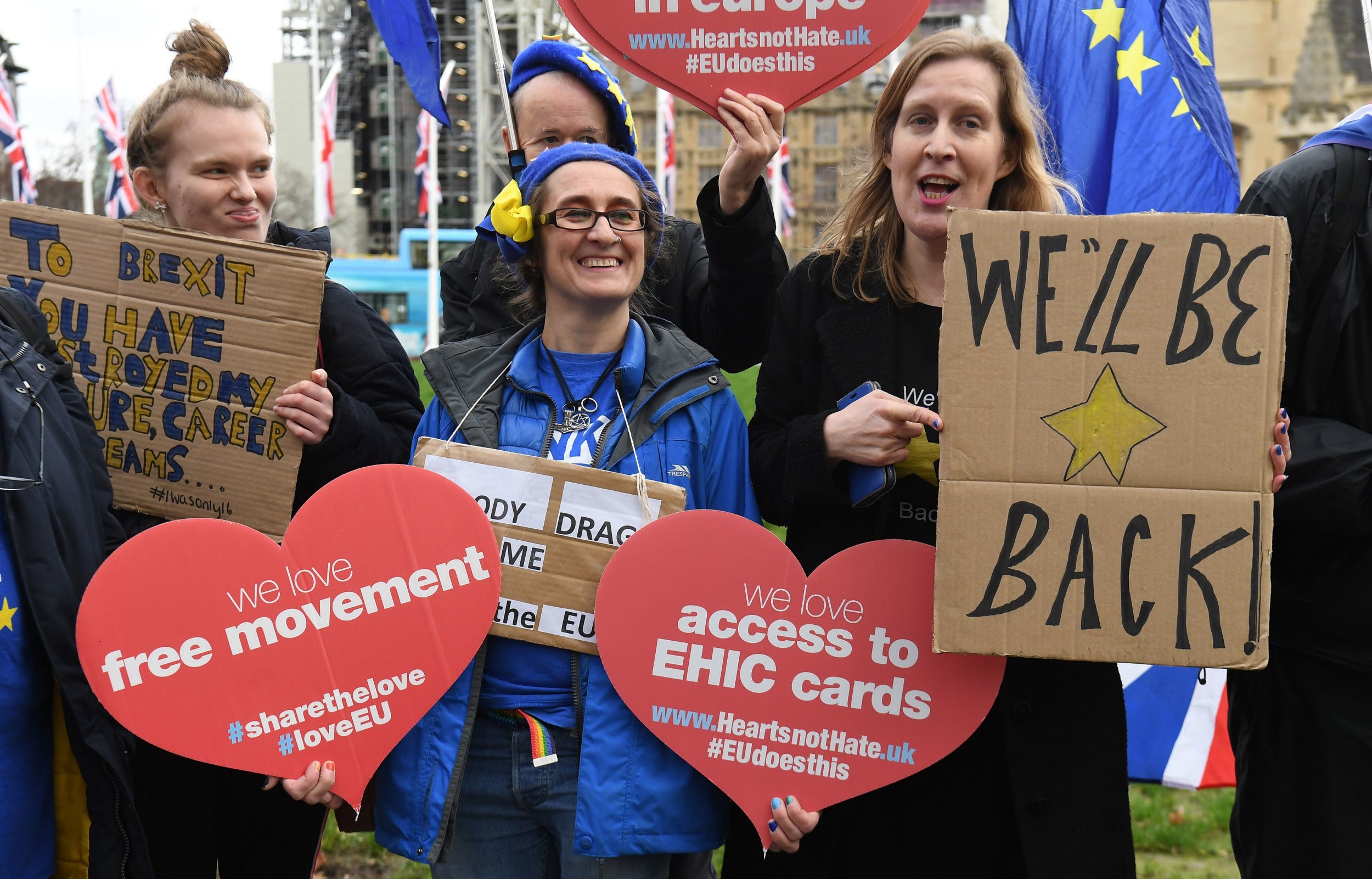
50/66
Anti-Brexit demonstrators in Parliament Square
PA
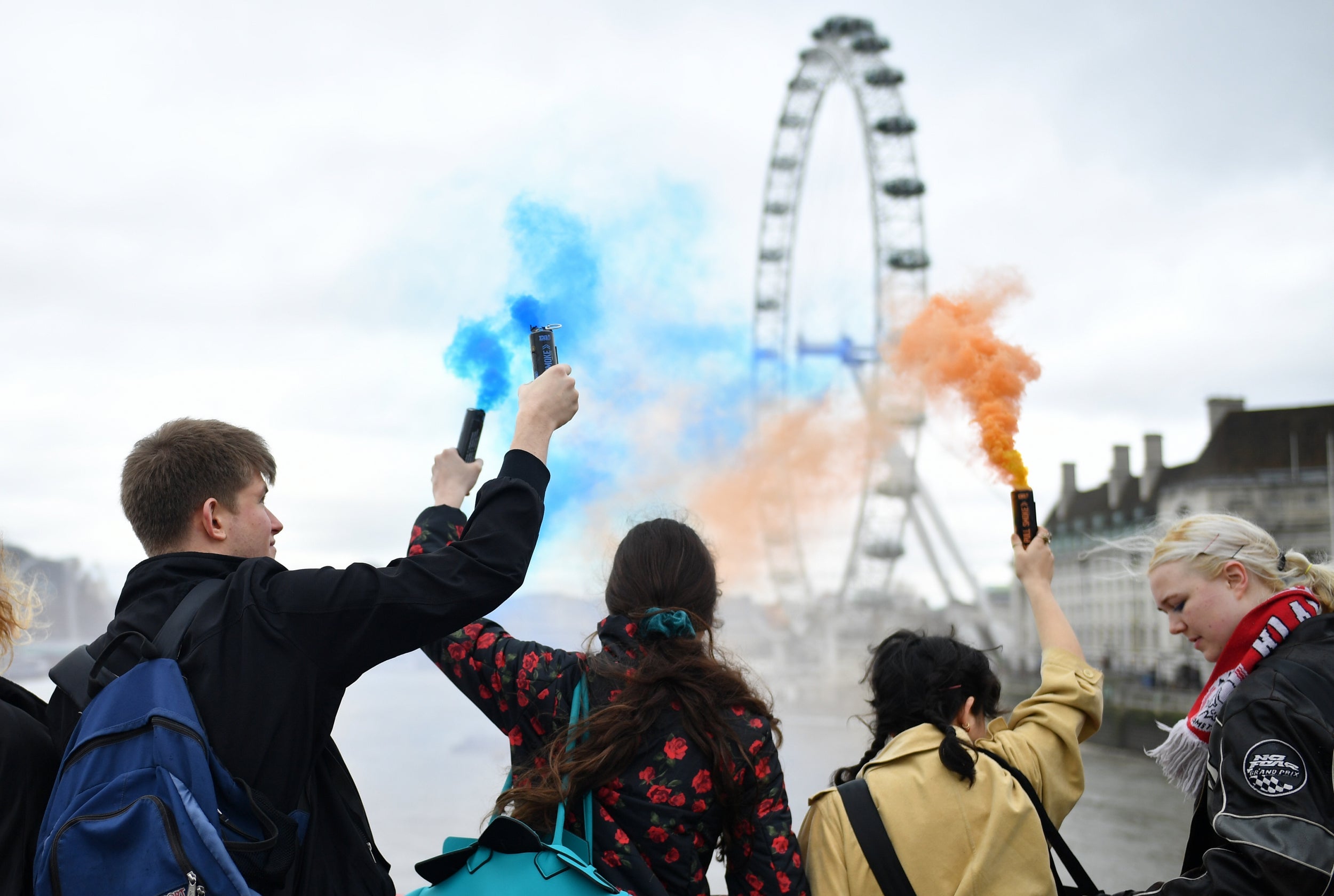
51/66
Pro EU supporters let off flares from Westminster Bridge
Getty
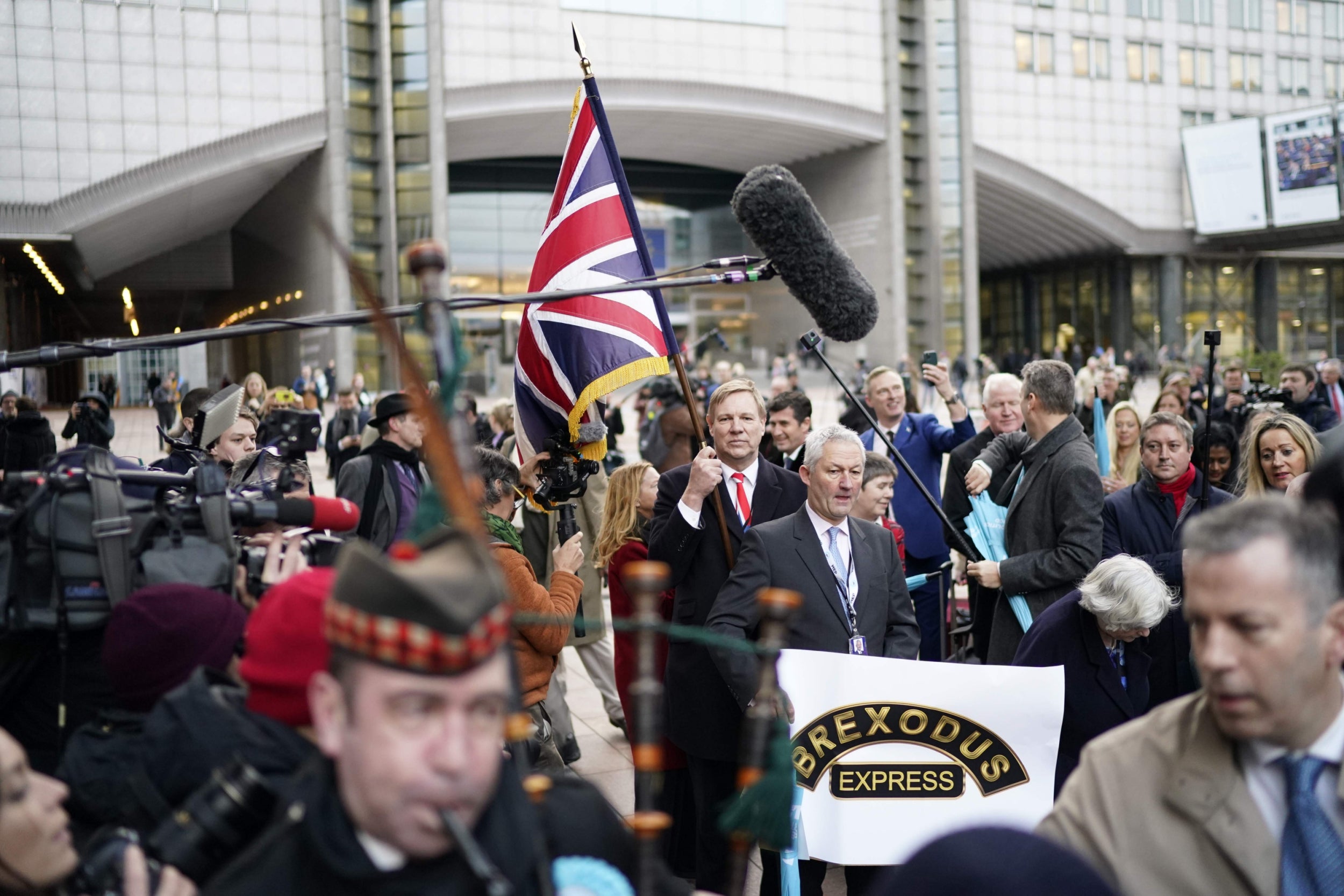
52/66
British MEPs Jonathan Bullock, holding the Union Jack flag and Jake Pugh leave the European Parliament, in Brussels on the Brexit day
AFP via Getty
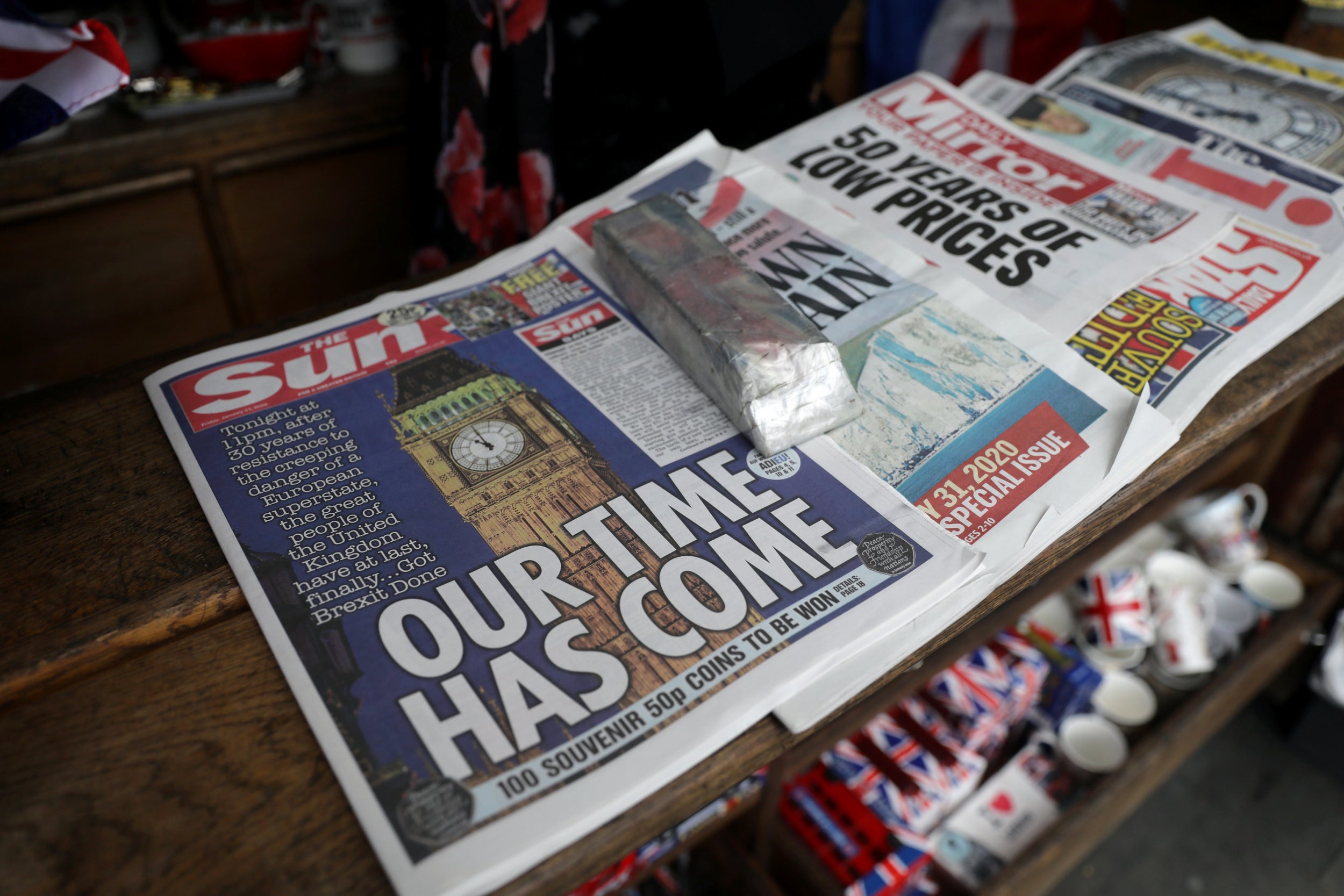
53/66
Newspapers and other souvenirs at a store, near Parliament Square
Reuters
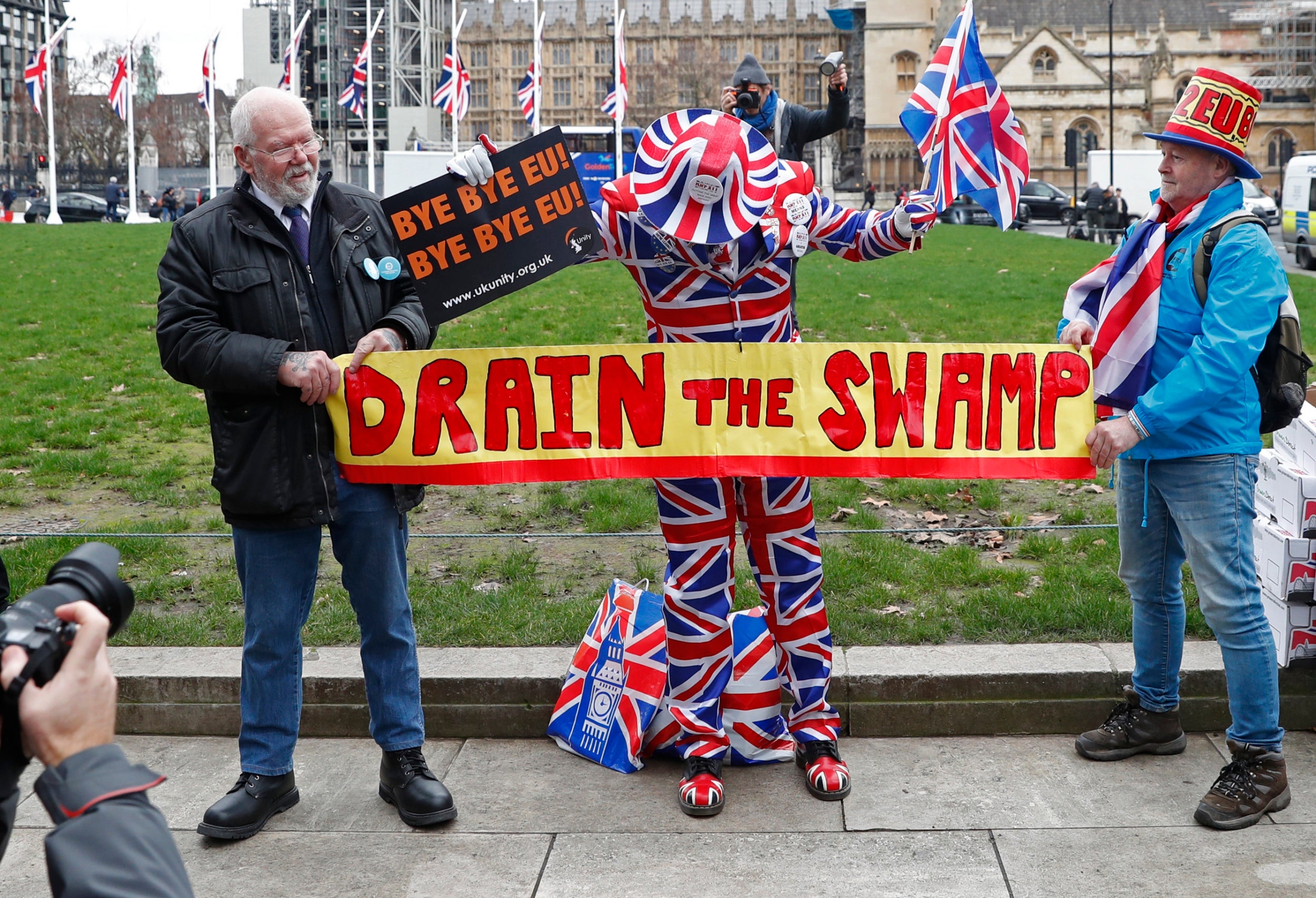
54/66
Brexit supporters hold signs in Parliament Square
AP
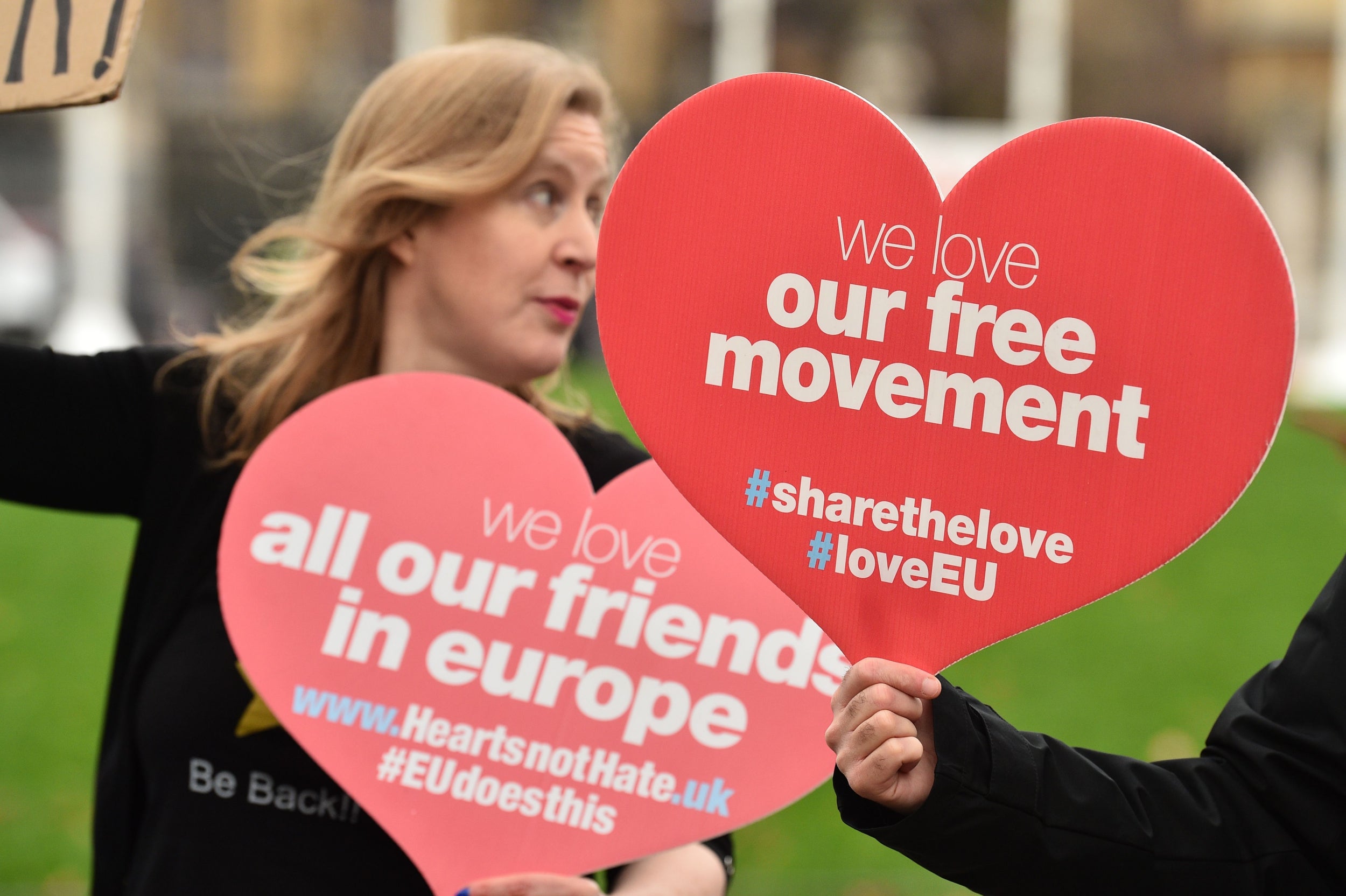
55/66
Pro-EU protesters hold placards in Parliament Square
AFP via Getty
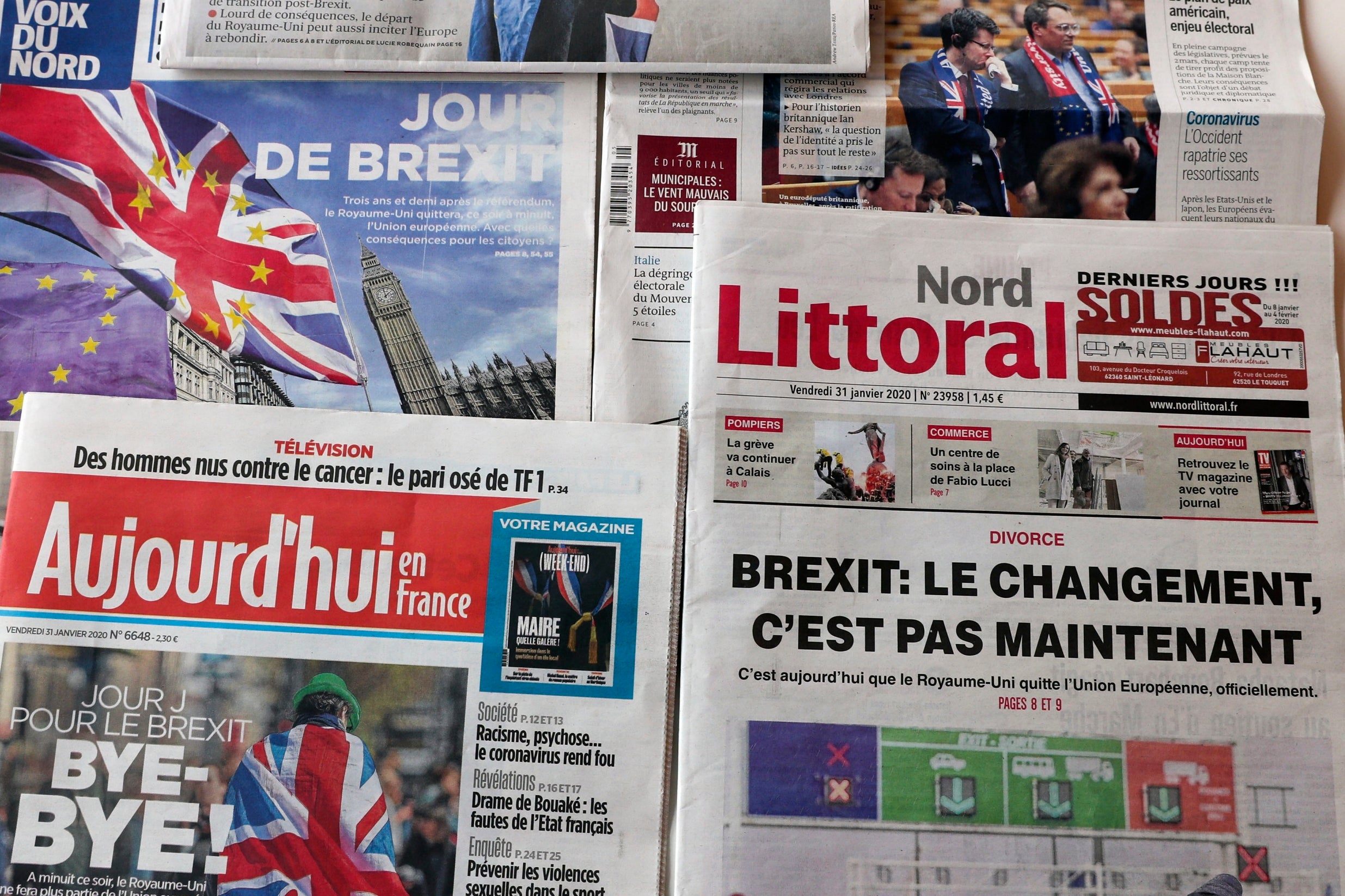
56/66
French newspapers
PA

57/66
Sinn Fein leader Mary Lou McDonald with a Border Communities Against Brexit poster before its unveiling in Carrickcarnon on the Irish border
PA
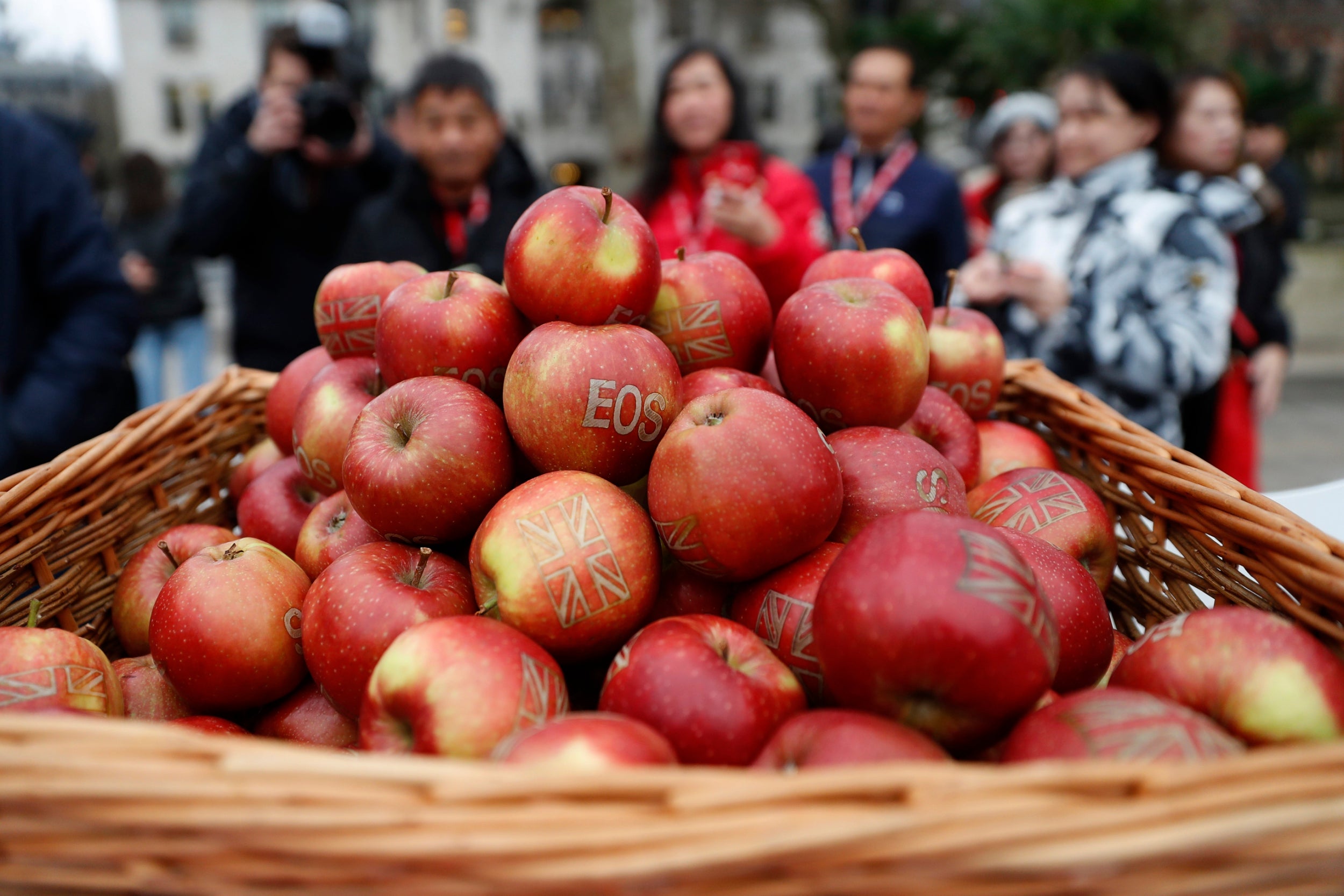
58/66
National growers organisation British Apples & Pears has renamed a British apple to EOS, the Greek goddess of dawn, to commemorate Brexit day
AP
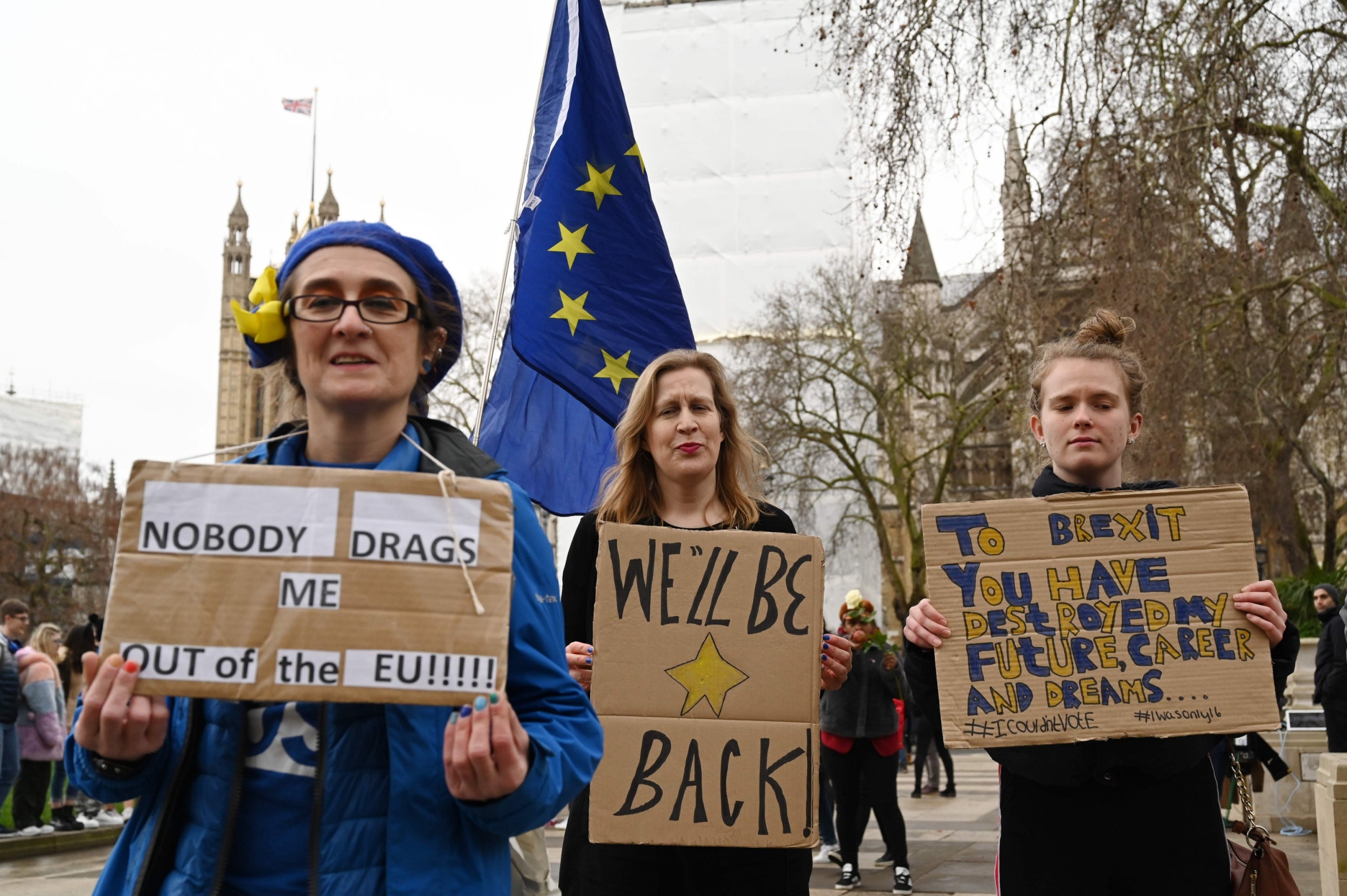
59/66
Pro-EU protesters hold placards in Parliament Square
AFP via Getty
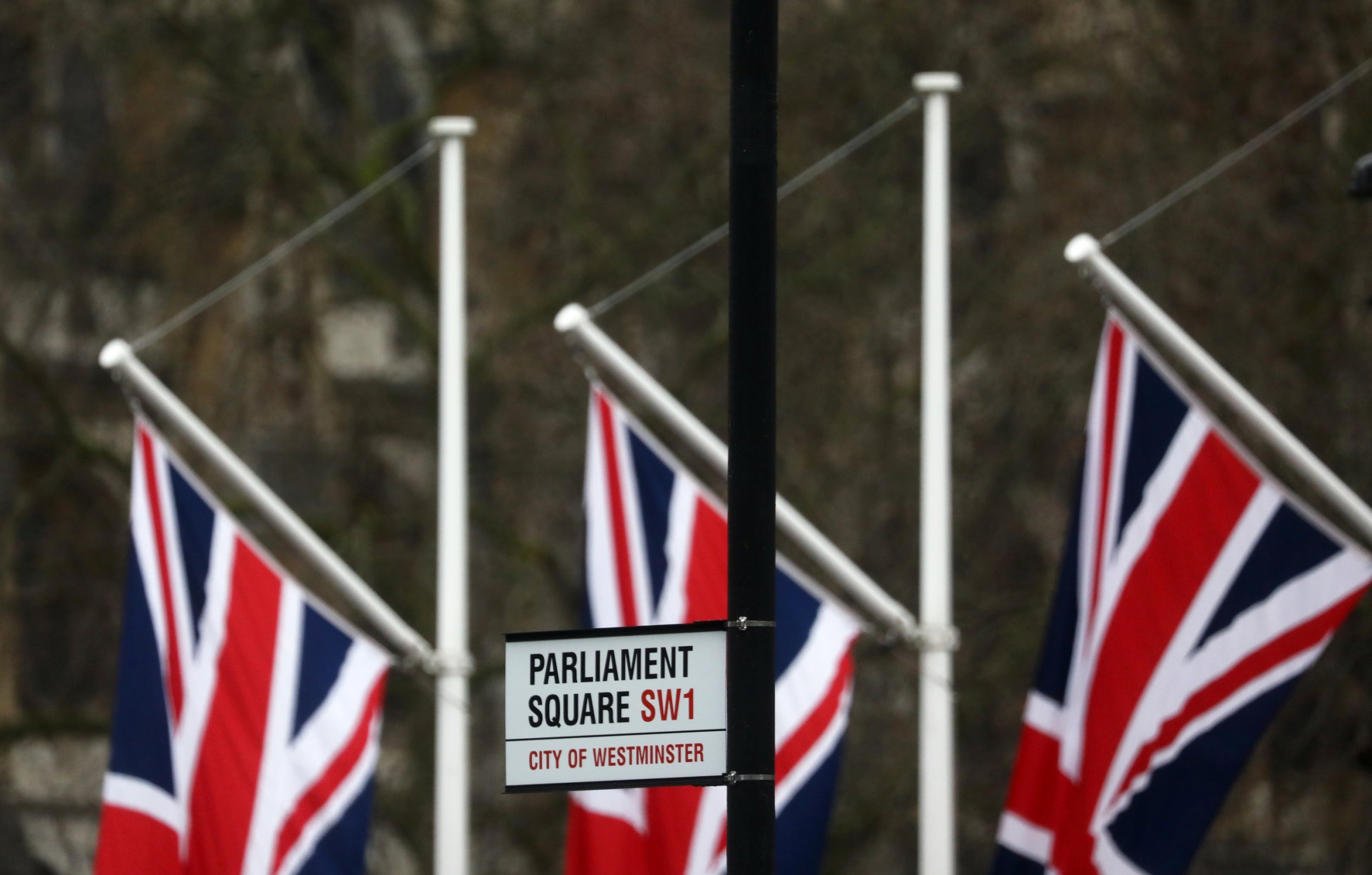
60/66
Britain’s departure from the European Union was set in law on January 29, amid emotional scenes, as the bloc’s parliament voted to ratify the divorce papers. After half a century of membership and three years of tense withdrawal talks, the UK will leave the EU at midnight Brussels time (23.00 GMT) on January 31
Reuters
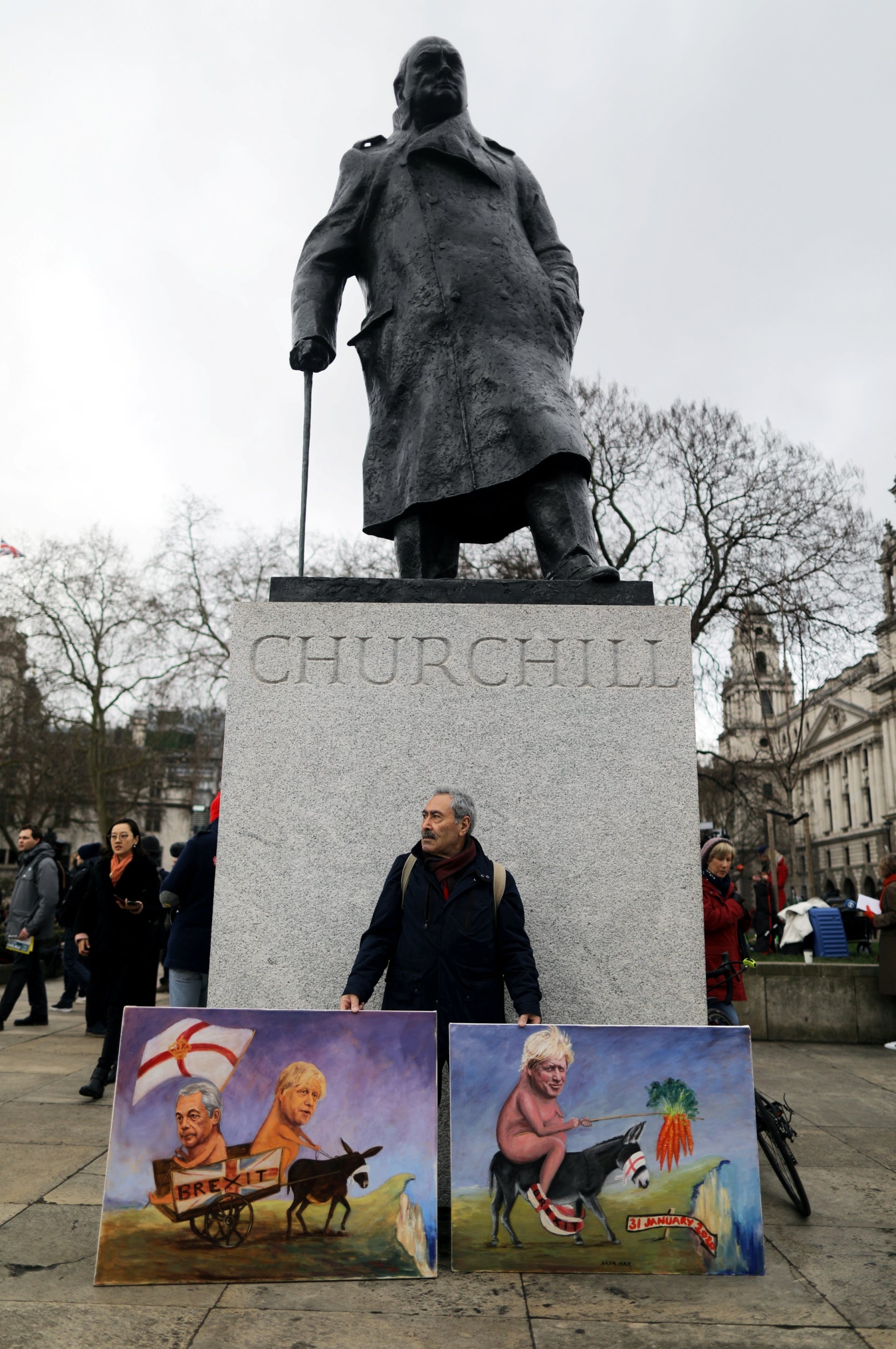
61/66
A man poses with paintings on Parliament Square
Reuters
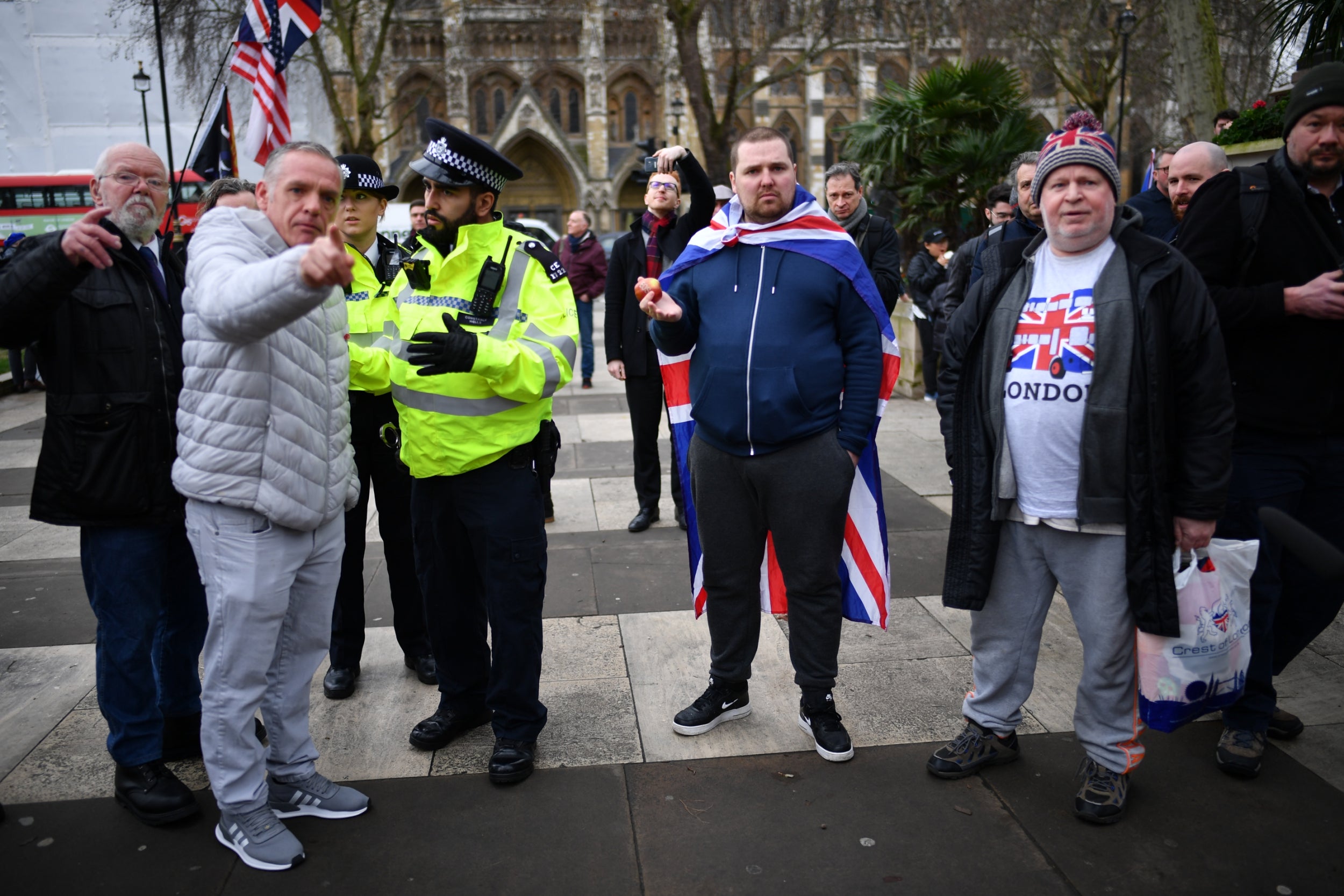
62/66
People sporting Union Flags gather in Parliament Square
Getty

63/66
A man walks with a St. George’s flag at Westminster bridge on Brexit day
Reuters

64/66
A British bulldog toy and other souvenirs at a souvenir store
Reuters
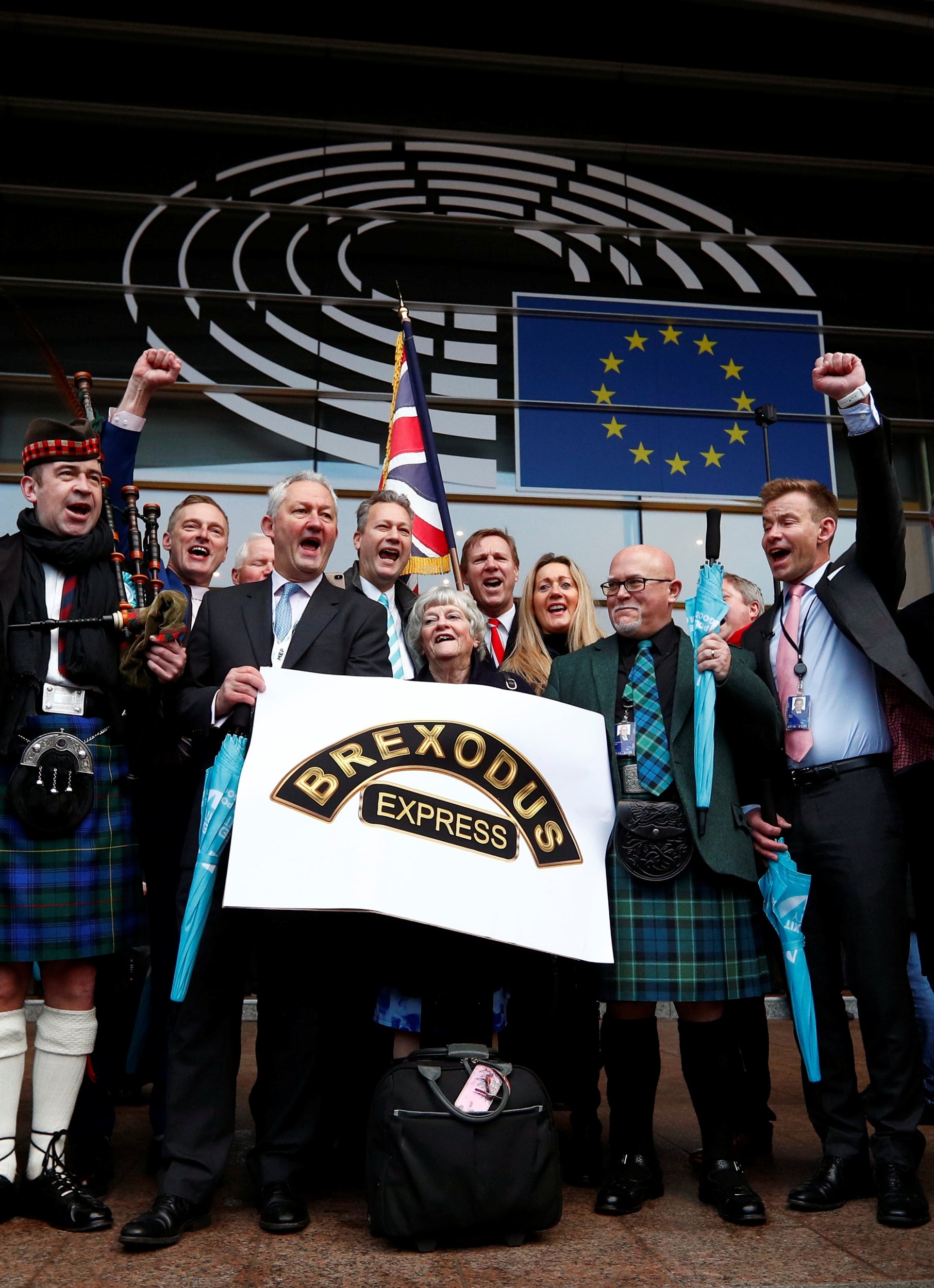
65/66
British pro-brexit Members of the European Parliament leave the EU Parliament for the last time
Reuters
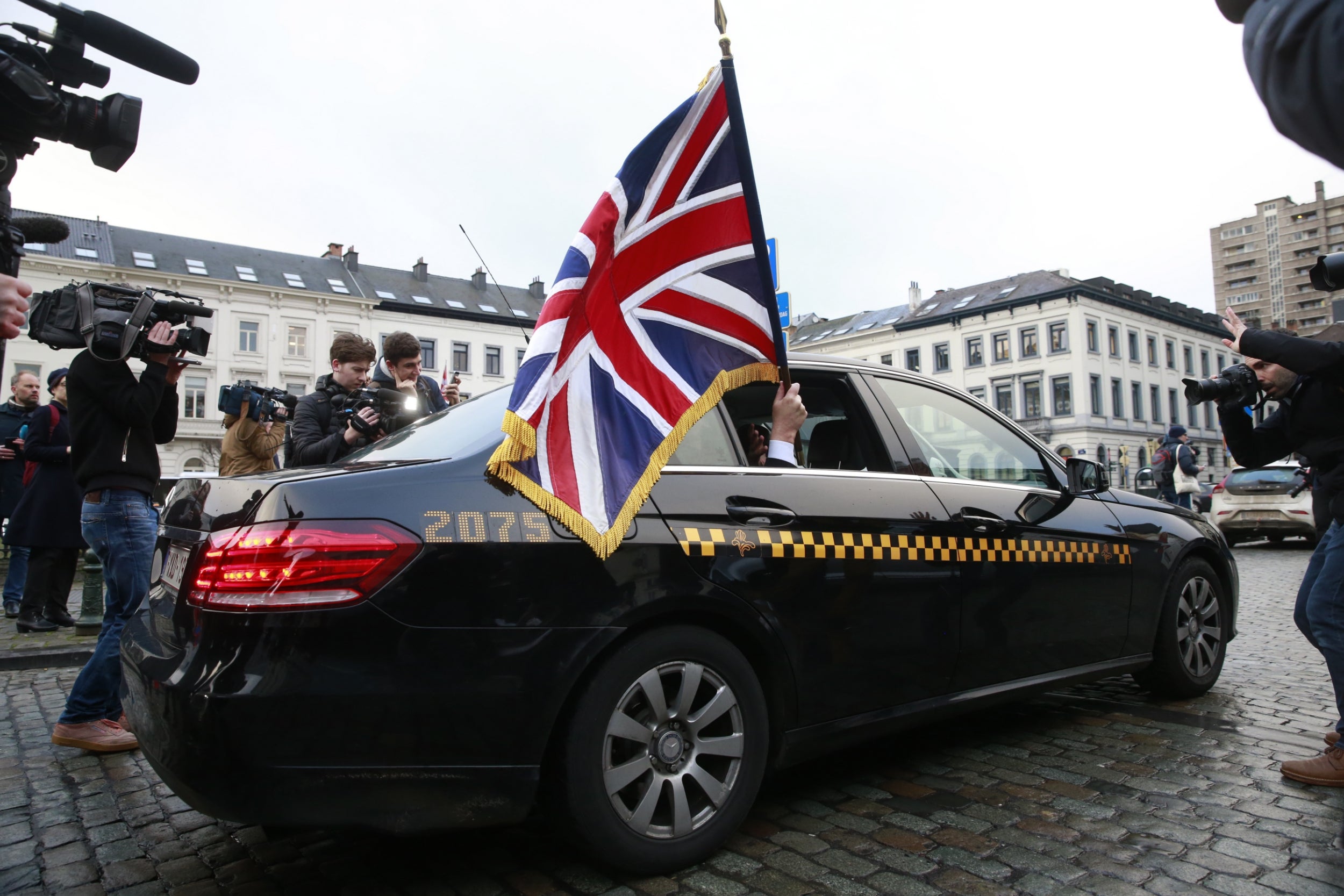
66/66
Jonathan Bullock waves the Union Jack as he leaves the European Parliament
EPA

1/66
A message projected onto the White Cliffs of Dover
Sky News/AFP via Getty

2/66
Getty Images

3/66
Big Ben, shows the hands at eleven o’clock at night
AFP via Getty Images

4/66
Nigel Farage speaks to pro-Brexit supporters
PA

5/66
Pro-Brexit demonstrators celebrate on Parliament Square
REUTERS

6/66
The Union flag is taken down outside the European Parliament in Brussels
PA

7/66
Pro-EU campaigners outside the Scottish Parliament, Edinburgh
PA

8/66
A pro-Brexit supporter jumps on an EU flag in Parliament Square
PA

9/66
EU Council staff removed the Union Jack-British flag from the European Council in Brussels, Belgium
EPA

10/66
A pro-Brexit supporter pours beer onto an EU flag
PA

11/66
Pedestrians pass in front of the Ministry of Defence Building on Whitehall, illuminated by red, white and blue lights in central London
AFP via Getty Images

12/66
A Brexit supporter shouts during a rally in London
AP

13/66
Pro-EU campaigners outside the Scottish Parliament, Edinburgh
PA

14/66
Pro-EU campaigners take part in a ‘Missing EU Already’ rally outside the Scottish Parliament, Edinburgh
PA

15/66
A large pro-EU banner is projected onto Ramsgate cliff in Kent
PA

16/66
Pro-EU supporters light candles in Smith Square in Westminster
PA

17/66
A man waves Union flags from a small car as he drives past Brexit supporters gathering in Parliament Square
AFP via Getty Images

18/66
The five-year old Elisa Saemann, left, and her seven-year old sister Katie hold a placard during a rally by anti-Brexit protesters outside the Scottish parliament in Edinburgh
AP

19/66
Pro Europe supporters gather on Brexit day near the British embassy in Berlin, Germany
EPA

20/66
Anti-Brexit protester hugs a man while holding a placard
REUTERS

21/66
A decorated, old fashioned fire pump in Parliament Square
PA

22/66
Pro Brexit Elvis impersonator performs at Parliament Square
Getty Images

23/66
An anti-Brexiteers stands with his dog in Parliament Square
AFP via Getty Images

24/66
Paddy from Bournemouth wears Union colours as he sits next to an EU flag decorated bag in Parliament Square
AFP via Getty Images

25/66
A pro-EU activist plays a guitar decorated with the EU flag during a protest organised by civil rights group New Europeans outside Europe House, central London
AFP via Getty Images

26/66
People celebrate Britain leaving the EU
REUTERS

27/66
A Pro Brexit supporter has a Union Jack painted onto his face at Parliament Square
Getty Images

28/66
Men hold placards celebrating Britain leaving the EU
REUTERS

29/66
Pro Brexit supporters dance in the street draped with Union Jack flags at Parliament Square
Getty Images

30/66
An anti-Brexit demonstrator spreads his wings during a gathering near Downing Street
AP

31/66
Pro EU supporters display a banner ‘ Here to Stay, Here to Fight, Migrants In, Tories Out’ from Westminster bridge
EPA

32/66
Pro-Brexit supporters burn European Union flags at Parliament Square
Getty

33/66
A man poses for a picture on Parliament Square in a ‘Brexit Day’ t-shirt
Reuters

34/66
People celebrate Britain leaving the EU
Reuters

35/66
AFP via Getty

36/66
A man wears a pro-Brexit t-shirt
Reuters

37/66
Anti-Brexit demonstrators visit Europe House to give flowers to the staff on Brexit day
Reuters

38/66
Pro Brexit supporter wears a novelty Union Jack top hat outside the Houses of Parliament
Getty Images

39/66
Customers Scott Jones and Laura Jones at the Sawmill Bar in South Elmsall, Yorkshire, where a Brexit party is being held throughout the day
PA

40/66
AP

41/66
Getty Images

42/66
Getty Images

43/66
Pro-EU activists protest
Getty Images

44/66
A pro-Brexit demonstrator burns a European Union flag
AP

45/66
Pro Brexit supporters
Getty Images

46/66
Pro Brexit supporters
Getty Images

47/66
A Brexit supports holds a sign in Parliament Square
AP

48/66
A man carries an EU themed wreath
Reuters

49/66
Ann Widdecombe reacts with other members of the Brexit party as they leave en masse from the European Parliament
PA

50/66
Anti-Brexit demonstrators in Parliament Square
PA

51/66
Pro EU supporters let off flares from Westminster Bridge
Getty

52/66
British MEPs Jonathan Bullock, holding the Union Jack flag and Jake Pugh leave the European Parliament, in Brussels on the Brexit day
AFP via Getty

53/66
Newspapers and other souvenirs at a store, near Parliament Square
Reuters

54/66
Brexit supporters hold signs in Parliament Square
AP

55/66
Pro-EU protesters hold placards in Parliament Square
AFP via Getty

56/66
French newspapers
PA

57/66
Sinn Fein leader Mary Lou McDonald with a Border Communities Against Brexit poster before its unveiling in Carrickcarnon on the Irish border
PA

58/66
National growers organisation British Apples & Pears has renamed a British apple to EOS, the Greek goddess of dawn, to commemorate Brexit day
AP

59/66
Pro-EU protesters hold placards in Parliament Square
AFP via Getty

60/66
Britain’s departure from the European Union was set in law on January 29, amid emotional scenes, as the bloc’s parliament voted to ratify the divorce papers. After half a century of membership and three years of tense withdrawal talks, the UK will leave the EU at midnight Brussels time (23.00 GMT) on January 31
Reuters

61/66
A man poses with paintings on Parliament Square
Reuters

62/66
People sporting Union Flags gather in Parliament Square
Getty

63/66
A man walks with a St. George’s flag at Westminster bridge on Brexit day
Reuters

64/66
A British bulldog toy and other souvenirs at a souvenir store
Reuters

65/66
British pro-brexit Members of the European Parliament leave the EU Parliament for the last time
Reuters

66/66
Jonathan Bullock waves the Union Jack as he leaves the European Parliament
EPA
It will be one of a few private rites. Inside the building of the now ironically named UK Permanent Representation to the EU – the base for British diplomats in the city – officials are holding a small, informal reception for officials and journalists. UKrep, as it is known, is being shut down because the UK is no longer a member state.
Then, at the beginning of next week, the same building and staff will host another reception, marking the foundation of the UK Mission to the European Union. The mission will have the same assignment as UKrep did: projecting British influence here – just without a seat at the table. As government ministers are fond of saying: Britain is leaving the EU, not Europe.



